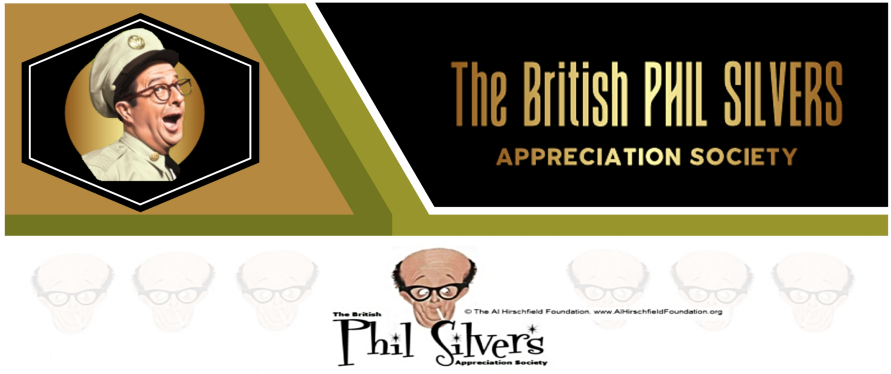Branscombe Richmond Saultes Phil Silvers
In 1976 Branscombe Richmond, along with another fledgling actor by the name of Steve Guttenberg, made a low-budget movie called The Chicken Chronicles. Little did they know they'd be cast alongside Phil Silvers! I recently caught up with Branscombe who found world-wide fame in the 1990's with the long running TV series Renegade and a major role in 2002's The Scorpion King. Branscombe, ever the gentleman kindly agreed to share his memories of acting alongside Phil Silvers.
Tell me a little about your background and how your career started?
BR: My father was a musician, actor, stuntman in Hollywood. Also he emmigrated to the United States. His uncle who raised him used to show silent moves and my Dad was curious on how they were made. Arrived in the US before the depression, got to Hollywood during and after the depression and made a go of it. I was a child actor who never really got anywhere. Had an opportunity to play pro basketball out of high school. Nine months later got dropped, started checking ID's as a bouncer, at the age of 19. Dad looked at me and said, 'Now what are you going to do with your life?' So between junior college and working as an extra in the movie business, I graduated to stuntman and that was my start. Oh yeah, my Dad loved the accordion, so I was playing music at the age of eight.
How did you land the role of Mark in The Chicken Chronicles?
BR: Well, they saw a lot of actors and I thought this actor named Evan Kim was going to get the role, but since Steve Guttenberg and I seemed to have some nice chemistry, I got it. I sure did learn a lot. I learned acting from on the set. Steve learned it from performing arts in New York City. Without him knowing, I learned a lot of stuff from him. Remember it was my first starring role. I was nervous, scared and elated! My Dad was so proud. I also worked at a local movie theatre and when the movie played there, they put my name on the marquee and there was my Dad on the street with his camera. Even though he was sick with cancer. So on our dinner table we had 24 marquee photographs to look at.
What was your impression of Phil Silvers at the time?
BR: Well, Phil was and still is an icon. So, when we heard that he was playing the role of Max Ober, we were all very excited! Me personally, I grew up watching him on TV. Boy the stories he would tell on the set! How lucky we were to spend time with him and learn the craft.
Was Phil cast from the outset, and how did he settle into the role?
BR: As you know Phil had had a stroke and was well on the road to recovery. His daughter came to try for one of the girl leads and mentioned to the producer, director and casting director, 'My Dad would be great for this part.' And she told everyone her Dad was Phil Silvers. Originally, the word around was the part was going to played by Ned Beatty. As far as settling in, Phil never settles in, he takes control right away and we followed. I learned a lot about ad libbing from him. For the first time, ad libbing was accepted but scary because you never knew where Phil was going to go with it!
Was it easy working with Phil? Were you and Steve in awe, or was it just another job?
BR: Phil was great. The only sign of him having suffered a stroke was maybe a little speech pattern difficulty. But otherwise he was 1000% ... he made us feel very comfortable. Steve and I were his 'kids', cause he called us 'Hey Kid' all the time. He was great, a consummate professional. There were maybe days when he was tired, but that was it. Remember this was a low budget movie. So you had to work hard, work fast and help out wherever you could.
Phil had high expectations for the movie, believing it was going to be as big as Rocky. Did you share that view?
BR: Wow, Rocky? That would have been nice. I knew we had something special but I was a young actor then ... and remember we filmed in 1976.
Were you happy with the movie, and were you proud to be working alongside Phil and Steve?
BR: I was very proud. My Dad cringed when he saw me drinking, cursing, smoking doobies in the movie. But he understood. Steve and I had a great premiere on Hollywood Boulevard. It was like the old days of Hollywood. Cinerama Dome, press, lights, big premiere. Geno Baffa was going to blow up, but during the summer he grew four inches and no longer looked like a sweet kid. He looked like a teenage man. He lives in Florida today selling time shares. Steve was planning on going to dental school after the premiere, so back to New York he went and left dental school when he got offered the movie Boys From Brazil with Laurence Olivier and Gregory Peck.
Do you watch the Bilko show, and do you regard it as one of the all-time classics?
BR: Love the Bilko show. More actors should study that show and learn about comedy timing. I mean how live can you get ... doesn't get any better than this show. Lots of great comedy actors came from the Bilko show. Yes, its a comedy classic, most definitely.
How would you rate Phil as a comedian, actor and performer?
BR: Number one comedian. Number one actor. Number one performer. Sadly they don't make 'em like that anymore. I mean just look at A Funny Thing Happened on the Way to the Forum ... unbelievable! Phil was also a very kind man and giving of himself and his time. So remember 'What, what, what' belongs to him!
Our heartfelt thanks to Branscombe for taking time out of his busy schedule and sharing his memories with us. The Chicken Chronicles received a limited video release in the mid 1980's and sadly hasn't been available for many years. A crying shame as Phil is on top form in a very enjoyable movie. Surely the time is right for a DVD release?
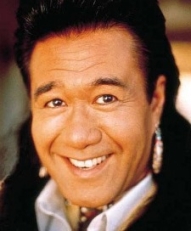
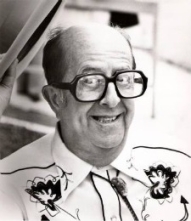
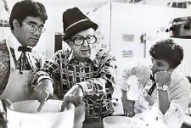
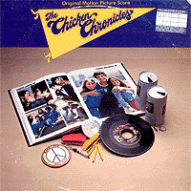
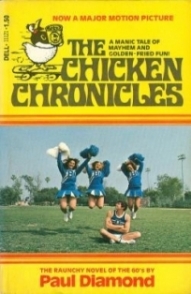
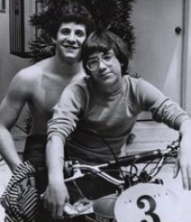
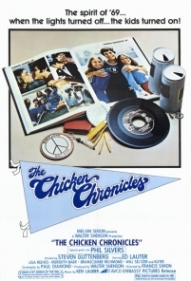
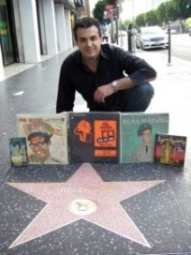
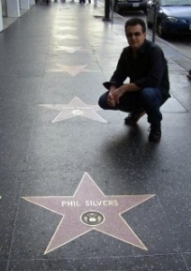
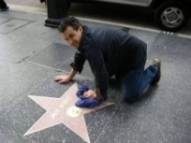
Saturday Night With Phil Silvers & Jack Benny
A fascinating account by fellow Phil Fan Zev Feldman on spending a pleasant Saturday evening tending to Mr Silvers and Mr Benny's Hollywood Stars on the Walk of Fame. Here's Zev's write up:
Upon my arrival to Facebook last May, I signed up for numerous groups including one devoted to one of my favorite all-time actors and comedians, Phil Silvers. When I was 16, I was introduced to the epic film, "It's A Mad, Mad, Mad, Mad, World". I was immediately turned into a Phil Silvers fan overnight, and have cherished his work in film, stage and television ever since.
Upon joining The British Phil Silvers Appreciation Society, I met a gentleman named Steve Everitt who was a total mensch and introduced me to a network of friends who all share our passion for this brilliant man who makes us all laugh so hard.
Steve (who's based in the UK) kindly suggested if I ever had some time, if I wouldn't mind polishing the Star of Phil, and his best friend, Jack Benny both of which are located on 6370 Hollywood Blvd.
On Saturday afternoon, I embarked to this site where I throughly cleaned and disinfected these 2 markers. Over the years, there has been an abundant build up of grime and tar which took a little elbow grease plus a combination of Ajax, Windex, Amonia, Brass Cleaner, and polish to get the shine back. Now Phil & Jack have the cleanest stars on the Hollywood Walk of Fame. I also made some friends along the way including several characters who make their residence on this sidewalk, and some tourists who stopped by to observe. Feel free to see the photos for yourself.
Phil & Jack, we salute you! Thank you for making me laugh and for all of the memories.
Candace & Steve: Thanks for allowing me to be involved. It's truly an honor.
Best Regards from Hollywood...
Zev Feldman
For any US fans or people travelling to Hollywood, California - Phil's star is located at:
6370 Hollywood Blvd.
Tracey Silvers
The Following interview was given to the society in 1992. Tracey Silvers is a successful screen-writer and producer and runs the SILVERS/KOSTER production company with her husband Iren Koster. Iren is also a writer, composer and director in the film business. SILVERS/KOSTER Productions are currently working on several projects.
What are your memories of Phil as a father?
My Father was very un-showbiz. He was a regular guy and I think that's what appealed to his fans. He was very much like the BILKO character. He was a Dad....he wanted to teach us baseball, even though we were all girls. He was very down-to-earth, very unmaterialistic...not what you'd expect from someone in showbiz!
When you were growing up, were you aware of just how famous your Dad was?
When BILKO was first on I was about 3 or 4 years old and it was required watching in our house. I'd see my Dad on television and I'd see him sitting next to me...it's hard for a child to understand that. He tried to explain to me what it was to be on television. He'd take me down to the set and introduce me to all the people on the show.
The Phil Silvers Show is hugely popular in England. Does that surprise you?
His biggest and best fans were in England. Towards the end of his life I'd say that 80% of his fan mail was from England. He was a real Anglophile...he loved anything English! I guess the English people have a greater appreciation of his humour!
Having been brought up with the show, what are your feelings about it today?
I understand it more. I understand the subtleties that my Dad brought to it. In a lot of the scripts Nat Hiken, or whoever was writing the episode, would often just put in "Phil says something funny here..." and my Dad would use his skills as a comedian to come up with something. So when I see it now I appreciate how hard my Dad was working. He was working hard to make the show good.
Many of the people who worked with Phil have commented that, as an actor and comedian, he was very giving when working...
He loved other comedians and he loved other actors. He admired a lot of dramatic actors too. There was a group of comedians...George Burns, Milton Berle, Jack Benny, Danny Thomas. They would all sit at the Hillcrest Country Club and go over each others acts and all help each other. It wasn't a case of "This is my line...that's my joke...you can't steal that..". They were all very helpful to each other. During the show he would always try to help everyone..not step on somebody's line or upstage them!
Over the years there has been a lot of gutter-press stories about Phil. They've played up stories about his health, depression, gambling etc. How do you feel about that?
It's infuriating. When my Father had a stroke in 1972 he was left paralysed on the left side of his body for about 6 months. Then gradually he began to recover...he got better and better. The stroke didn't affect his mind at all. It infuriates me when I read some of the stuff they write about my Father. He was very happy in his later years. He had a grandchild who he adored and spent a lot of time with. He had his moments of course...he was not happy that he never fully recouperated from having a stroke. We went out most weekends to the movies. He loved going to the movies. We went out to dinner.
Did Phil ever express any resentment at people knowing him only as BILKO?
He loved BILKO and he loved the character. He was very much like BILKO. Nat Hiken didn't just create the character from nowhere. So he was very happy to be remembered that way!
How did THE BILKO GROWL come about?
It was actually the last thing my Father did. My husband Iren wrote the song. He and my Father adored each other and wanted to do something together. They used to write lyrics together for songs. So Iren said "I'll write a song and we'll sing it together.". So he wrote THE BILKO GROWL. It was very funny. It was really made for fun you know.....between them!
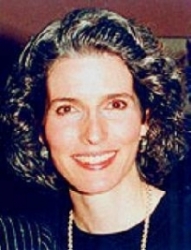
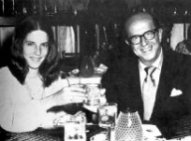
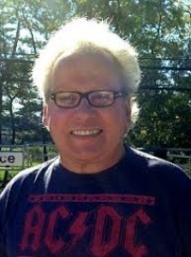
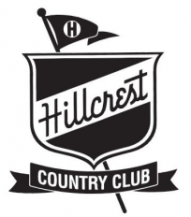
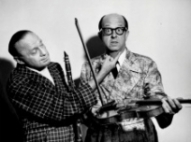
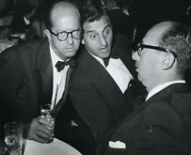
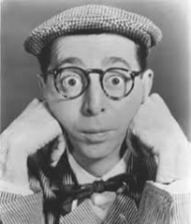
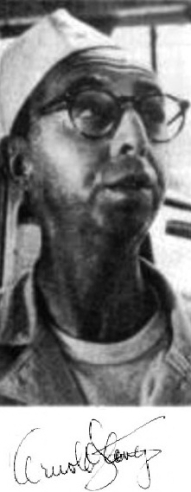
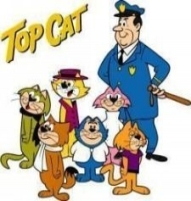
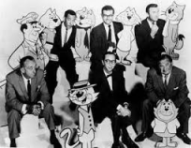
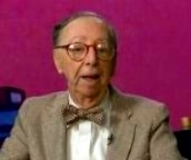
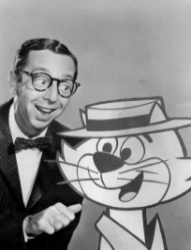
Arnold Stang
Arnold Stang is perhaps best know for his role as TC in TOP CAT, the hugely successful HANNA/BARBERA animated show based on SGT. BILKO. Arnold has enjoyed a lengthy career which has seen him work in every form of showbusiness. In 1963 he also appeared opposite Phil Silvers and Jonathan Winters in IT'S A MAD, MAD, MAD, MAD WORLD.
The following interview took place in 1987.
How did you get your start in showbusiness?
I started as a child actor. I was about 9 and started in radio doing a show called LET'S PRETEND. Then I started doing a programme called CHILDREN'S HOUR, which later moved onto television. Then I went into theatre and from there into films. I also wrote some music and some songs I even appeared on Broadway!
You've done a lot of voice-over work. Were voices and vocal characterisation something you were always interested in?
When I was doing radio I was also doing a lot of voices for theatrical cartoons. I did a series called HERMAN THE MOUSE and I got offered a lot of voice-over work. I did POPEYE, BETTY BOOP, CASPER THE FRIENDLY GHOST... things like that. Then I started doing some voices for Disney. I did all the WINNIE THE POOH records and I did ALICE IN WONDERLAND!
So presumably TOP CAT was just another job you were offered?
Sure. There was a company called HANNA/BARBERA who I had already done some voices for. They asked me to come in and do some voices for a new show about a gang of alley cats. I pretty much worked for all the major animation studios.
Were you aware of the obvious similarities between SGT. BILKO and TOP CAT?
It was very clear to me and to most of us on the show, that whoever had put the show together had undoubtedly been influenced by SGT. BILKO. There were very direct parallels no question about it.
Maurice Gosfield, who played Pvt.Doberman in SGT. BILKO, played much the same character as BENNY THE BALL. What was he like to work with?
He was a very sweet man. Not what I would call an actor but a great character. Sadly he's dead now...but a lot of people don't realise that. I get a lot of mail about TOP CAT and very often people want to know about BENNY..."Where is he now? What is he doing now?"...those sort of questions!
In 1963 you appeared with your TOP CAT co-star, Marvin Kaplan, opposite Phil Silvers and Jonathan Winters in IT'S A MAD,MAD,MAD,MAD WORLD. How long did you work on the film?
I was on the picture for about 4 weeks. My scenes took about 2 weeks to film. We filmed in the studio and on location. The location filming was very hot and I almost melted under the sun! I hung around before and after shooting my scenes, getting to know people...talking to Phil Silvers and the like!
There have been reports that Stanley Kramer cut the movie quite heavily before the film went on general release. Is there any truth to that?
When it originally opened, at it's world premiere, it ran for 4 hours. I recently got invited to a 3-day MAD WORLD festival! They were going to show the full, un-cut version of the movie. They had located the missing footage. They had artefacts from the movie, they planned a series of interviews and seminars...but I couldn't go, I was just too busy!
Do you have any particular memories of working on MAD WORLD?
Yes I do. Before I started shooting the movie I broke my arm. I didn't want to miss the shooting so I had to film with a broken arm. I couldn't wear a cast because it would show. If you look closely at the movie you can see I have on a large glove and I'm moving in such a way as to protect my arm! I must say I was in a lot of pain during filming!
Did you enjoy working with Phil Silvers?
Oh yes indeed. I enjoyed working with both Phil Silvers and Jonathan Winters. Of course it was also a reunion with my friend Milton Berle. We had worked together a lot on television. We only had one scene together but didn't exchange one word of dialogue. That was strange because on television we had almost been a team. I also got to know Spencer Tracey very well. A lot of people forget that he was in the movie.
TOP CAT is still hugely popular with audiences. How do you feel about that?
It's very nice to know that something you did is so well remembered. I still occasionally work as TC and I expect to be doing more of him in the future...but my usual feeling is I'm more concerned with what I'm doing now or in the future than what I did in the past!
So what does the future hold for Arnold Stang?
Well I've got some movie work lined up. I have some commercials to do and I'm going to be doing some voice-over work for a couple of TOP CAT projects. There's also talk of a TOP CAT theatrical movie for the big screen!
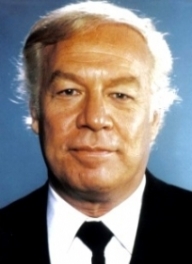
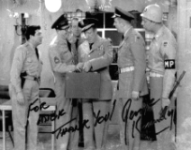
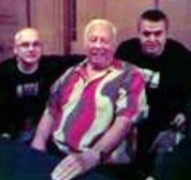
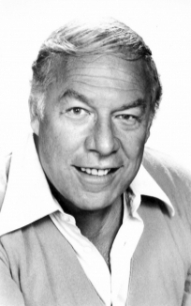
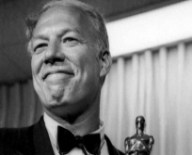
George Kennedy
Second World War veteran and Oscar-winning actor George Kennedy began his career as a technical advisor on THE PHIL SILVERS SHOW. It would prove to be an experience that George would never forget and to this day he still credits Phil Silvers and Nat Hiken with getting him his break in showbusiness. We recently had the great pleasure of speaking to George and here are some of his memories of working on the show.
"It was such a pleasure working on the show. One memory I have is being used as a sharpshooter. Once in a while they would call for the Colonel, Paul Ford to have something shot out of his hand. Anytime they asked for that Paul would say "Give the rifle to Kennedy. Don't give it to any of those clowns, they'll kill me!" They'd give me a pellet gun and I'd shoot the thing right of of his hand... he knew I wouldn't miss!"
As technical advisor on the show George was required on-set at least three days a week. He found himself watching and learning from the actors. Every now and then he was asked to appear in the show (usually listed as Sgt.Kennedy!), something again that sparked some happy memories...
"It was such a pleasure appearing on the show. Boy they were wonderful. They were such fun people. Phil was magical. He came from Burlesque you know and that was a great training ground. He was such a great comedian. He had that timing that all the Borscht-belt comedians had. Phil, Jack Benny, George Burns... they all had that great timing."
So did George have any lasting memories of working on THE PHIL SILVERS SHOW?
"I just have such wonderful memories. I remember them all because of what they meant to me in my life... everything I learned as an actor I learned from them... those wonderful people!"
After the show, George went on to establish himself as a hugely successful actor. During the 1960's he appeared in almost every successful American TV series including McHALE'S NAVY, RAWHIDE, & BONANZA. In 1967 he won the Oscar for Best Supporting Actor (opposite Paul Newman) for his performance in COOL HAND LUKE.
During the 70's & 80's he appeared in such films as THUNDERBOLT & LIGHTFOOT (with Clint Eastwood), CAHILL-US MARSHALL (with John Wayne), AIRPORT '75 and THE EIGER SANCTION.
He enjoyed great success as Capt.Ed Hocken in the NAKED GUN movie series opposite Leslie Nielsen, and on television as Carter McKay in TV's DALLAS.
"Just before he died Phil came to me and said this, "You know George, in showbusiness there are a lot of people who are grateful, and there are a lot who are not. They're not snobs...they just don't think about it! You have never, ever failed to give us credit....far too much credit than we deserve... for your success...!"
"My point is that here was a man who gave everything to a show....yet still cared about the people around him. He owed me nothing yet he helped me. He was my friend...till the day he died. They gave me a great gift... those wonderful people and I'll never forget that!"
Sadly George Kennedy passed away in Eagle, Idaho on the morning of Sunday, February 28, 2016, at the age of 91. At the time of his death George was residing in an assisted living facility due to his poor health. His last on-screen role was in the 2014 remake of The Gambler, alongside Mark Wahlberg.
At the time of his death, George was cited as being the oldest living Oscar winner in the Best Supporting Actor category. Coincidentally, he died the day of the 88th Academy Awards ceremony. He is survived by a daughter, by a grandson, and by a granddaughter whom he helped to bring up after her mother developed drug addiction problems.
Martine Beswicke
At Autographica 13, held at the Hilton Metropole in Birmingham we had the opportunity to speak with three-time Bond girl (Dr. No, From Russia with Love and Thunderball) and Hammer Horror actress Martine Beswicke. Martine has enjoyed a prolific career in cult classics like Slave Girls, One Million Years BC (with Racquel Welch) , Dr Jekyll and Sister Hyde (with Ralph Bates) and A Bullet for the General.
During the early 70's Martine relocated to Hollywood and carved a highly successful career in episodic TV working on such shows as Rod Serling's Night Gallery, Falcon Crest, The Six Million Dollar Man, Mannix, The Fall Guy and Fantasy Island.
In 1980 Martine was offered the lead role of Xaviera Hollander in the Golan Globus production The Happy Hooker Goes Hollywood. Although initially reluctant to get involved with the project she was eventually seduced when the producers announced the stellar cast would include Adam West, Chris Lemmon, Richard Deacon, Edie Adams and our very own Phil Silvers! Now retired from the industry Ms Beswicke took the opportunity to sing Phil's praises, which she kindly agreed to share with us all!
Hello Martine, can I ask you about working on the Happy Hooker movie? Did you enjoy acting alongside Phil Silvers?
"He was really sweet. I loved his humour! When we made the film he used a lot of idiot boards and he would read through one and then woosh straight on to the next one. He was so fast and still very sharp. A lovely man. He played his part sitting in a wheelchair and that was not easy to do....to read those idiot boards and still manage to emote and be funny. I loved him."
On release the film received mixed reviews. How do you rate the
movie 29 years later?
"The film was not great. The producers were terrible but we had such fun and such a great cast. We had Adam West, Richard Deacon, Chris Lemmon and of course Phil! We had a scene where Adam & Richard had to dress up in drag. It was hilarious and I couldn't stop laughing at them!"
Have to ask, are you a fan of the Bilko show?
"I love Bilko. It was a really funny show and Phil was just wonderful in it. On the film he was very cantankerous and playful...I called him 'the old goat'. He was very sweet and very funny and I just loved him!"
Are you still active in the industry?
'I'm retired now. I just lost my passion for acting and the industry and found I no longer had the desire anymore!"
Martine Beswicke
18 April 2009
In recent years Martine has devoted her time to film documentaries, providing commentary and relating her experiences on the many films and TV series she has appeared in. She also runs a very successful removals business based in London.
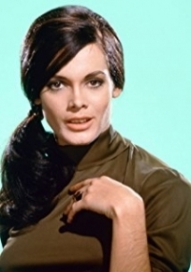
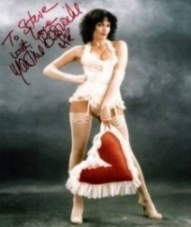
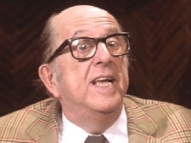
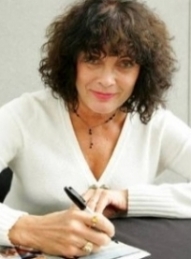
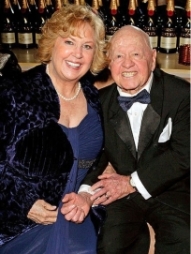
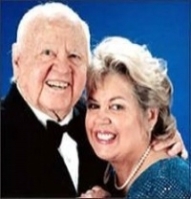
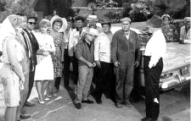
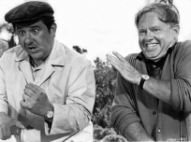

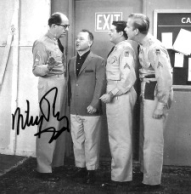
Jan & Mickey Rooney
If you were to look up the definition of 'Hollywood Legend' - the description would surely say - Mickey Rooney! Child star, Singer, Dancer, Actor - star of stage and screen...winner of an Oscar, two Golden Globes and an Emmy. This man has done it all!
In 1978 Mickey married actress Jan Chamberlin and for the last 31 years Jan has been Mickey's rock. Deeply devoted to each other, they continue to do commercials, stage work and live appearances.
We recently had the privilege of meeting Jan & Mickey and following that meeting they had this to say:
I must say... it was a real pleasure to meet you at the Autographica event… and hear about your involvement with the Phil Silvers Society... and MAD WORLD. Nice to hear you are carrying that important piece history on for us all to enjoy. We thank you for that.
I spoke just this morning with Mickey regarding some tidbits from Phil Silvers… Mickey expressed his feeling towards Mr. Silvers as Phil being a very sweet, warm and friendly guy. He also mentioned "We both had lunch at Cantors Deli together (several times) and had the best MATZA BALL soup in the world… and chatted over the greatest DELI sandwiches!"
Mickey recalled that Phil was chatting to him about being in the movie called A FUNNY THING HAPPENED ON THE WAY TO THE FORUM … and how much fun it was to be in it. Little did Mickey know, years later he himself would be doing the stage play!
On MAD WORLD… Mickey told me that it was one of his favorite comedy movies… and that Phil Silvers thought also it was one of his favorites. Then Mickey said "Oh and Jack Benny was so wonderful to talk to on the set… the three of us had a lot of laughs together!"
Then… it was interesting… Mickey just today… (thanks to you prompting the recall) said he had spoken with Phil about unhappy marriages… and Phil said "Yeah Mickey, I know all about divorce. I’ve been divorced myself a couple of times but don’t worry Mickey, one day you are going to find a woman who is going to be with you the rest of your life!"
I cannot get across enough how close Phil and Mickey became on the MAD WORLD set. It was delightful to hear today, Mickey recalling his thoughts. I do remember Mickey over the years saying what a great guy Phil was, but he had never gone into any detail before this.
Also, Mickey said… (just this morning) "Jan, I am so glad you stayed with me all these years… and didn’t fall in love with me because I was a celebrity!" And I recall... the one big reason I didn't want to marry Mickey was because.. not only of his past marriage history but because of his being a well known celebrity at one time. Years before I met him of course he was the "No. 1 STAR of the World" That actually put me off in regards to marrying Mickey. But who could resist his charm and energy etc. I gave in… and am VERY GLAD I DID... (most of the time) HA HA LOL! He certainly changed my life..he helped me raise my two boys (CHRIS and MARK)… and put me in a NON STOP TRAVEL MODE. Hectic but VERY VERY INTERESTING. MICKEY IS ONE OF A KIND… and that's for sure!
I will try to get back to you at some point... for a couple more thoughts concerning Mickey’s career. Thanks again for your kind words and interest in Mickey…. much appreciated.
All the best to you and yours
Love,
Jan and Mickey Rooney
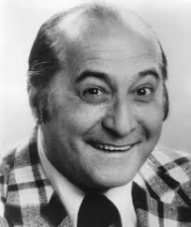
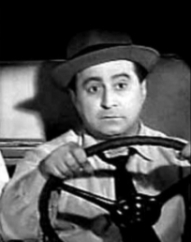
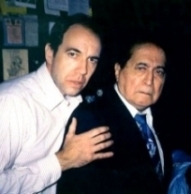
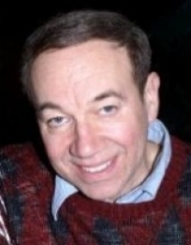
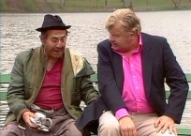
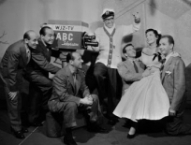
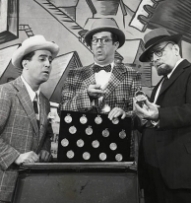
Joey Faye
Joey Faye, character actor of stage, screen, and television, was born Joseph Palladino in July 1909. He later adopted the surname Faye from his friend and fellow Burlesque performer Bobby Faye, brother of Herbie Faye. He was among the last of the great burlesque comedians and widely known in showbusiness circles as a great "Second Banana". During his lengthy career he performed alongside such as stars as Gypsy Rose Lee, Marlene Dietrich, Abbott and Costello, Tony Randall, and John Wayne.
Joey started as a Borscht Belt comic during the early '30s. While working in primarily in the Catskills resorts, he began performing alongside such comics as Phil Silvers, Rags Ragland, and Abbott & Costello. Joey made dozens of TV appearances icluding PERRY MASON, THE DETECTIVES, 77 SUNSET STRIP, CAR 54 WHERE ARE YOU? and THE JACKIE GLEASON SHOW. He also appeared alongside Phil Silvers in HIGH BUTTON SHOES & TOP BANANA. Most notably he appeared in what is considered to be the most memorable episode of THE PHIL SILVERS SHOW...THE COURT MARTIAL (as Harry Speakup's keeper!). His final TV appearance came in BENNY HILL AROUND THE WORLD: NEW YORK in 1991. Sadly Joey passed away at the age of 87 on April 26, 1997.
The following article was written especially for the Society by Michael Townsend Wright. Michael is a gifted actor and performer in his own right and was lucky enough to have spent several years peforming Burlesque skits with Joey. Here then are Michael's recollections of the time he spent with Joey!
Joey Faye: My Memories of a Top Second Banana
I first met Joey in the early '80s here in New Jersey. He and his wife Judi lived in Staten Island, NY, just a short ride away. They were shopping as I was, in a sort of auction house with great bargains. Being show people we love bargains. I immediately recognized him and began feeding him lines from old bits. He was suprised that a somewhat young man knew of these things and we hit it off like old friends very quickly. Joey and I kept in touch and would often run into each other at theatrical events. He was a wonderful person with an endearing little boy quality.
Harry Goz, the longest running Zero Mostel replacement in the Broadway production of Fiddler on the Roof, had been Joey's sketch partner for some time. Harry was no longer able to work with Joey due to other committments, and Joey asked me to take his place. Of course I was thrilled to do it. For the next six years or so Joey and I, often with his wife, Judi, performed FLOOGEL STREET, SLOWLY I TURNED and many other Burlesque sketches. We once asked Marc Fields, grand nephew of Weber and Fields' Lew Fields and fine theatrical historian and author, to be our stooge in SLOWLY I TURNED. He loved it.
Joey always told me that he and Sid Fields (Mr. Fields, the landlord in the Abbott and Costello Show) had written SLOWLY I TURNED in their Minsky days. Also, Joey was one of several comics who sued Universal over Abbott and Costello's use of FLOOGEL STREET in IN SOCIETY. And he won! Now, I know Burly historians claim that Billy K. Wells actually wrote many of these bits, but I think they all borrowed from each other and created their own variations. Who can say for sure?
Now, getting to the important subject at hand: Joey's connection to Phil Silvers.
First of all, Joey always spoke very highly of Phil. They were very close in Burlesque and I believe they enjoyed working together; and as we see in the filmed version of TOP BANANA, they had a wonderful chemistry. I recall some stories Joey told me. When they were both young, Phil was a popular fellow and would date some of the girls they worked with. Joey was very shy and never had the nerve to ask any of them out. Phil was so popular, he would sometimes forget he had made a date and the girl would be waiting after the show. Here was sheepish Joey Faye with nothing to do. "Let's go out, Joey." And there you have it: instant social life.
Phil would often ask for Joey in later years, for Broadway shows such as HIGH BUTTON SHOES and the aforementioned TOP BANANA and also TV appearances.
This brings me to a very interesting story Joey told me. When it was announced that Nat Hiken was going to be filming a new show with Phil Silvers, Joey called Phil, as I'm sure many of his old Burlesque pals did. According to Joey, Phil told him: "You're in , kid, don't worry about it. But don't call Nat. I'll take care of it."
Now, time went by and the show was about to go in production. Joey called Phil a number of times and got the same response. As filming began it was clear that Joey had not been cast. He later found out from Nat Hiken, according to Joey, that he was a sure thing for the show, but just before casting was finalized Harvey Lembeck asked for a part, stating he really needed steady work as his wife was about to have a baby (Michael, I guess). So Harvey was in and Joey was out. I ran this story by Mickey Freeman, and he disputes it. He said Harvey was always in, especially with his success in STALAG 17. Once again, who can say for sure? However, Joey did get to play the owner of the famous Harry Speakup, the subject of one of the most hilarious episodes of Bilko.
Well, I hope you enjoyed these show business stories! I don't for a moment think I could step into the shoes of Joey's old sketch partners- Rags Ragland, Jack Albertson and of course Phil himself--but I must say it was a great honor, and so much fun, to try them on for a little while.
Michael Townsend Wright
May 2009
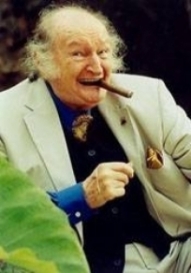
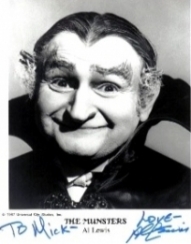
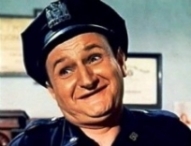
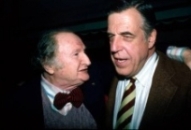
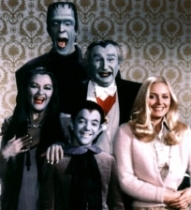
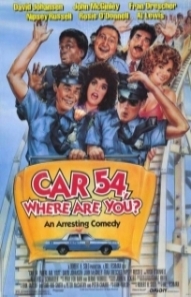
Al Lewis
Al Lewis was born April 30th, 1923 in Brooklyn, New York. He was an actor, an eccentric, a restaurateur, a sports scout, a radio broadcaster and even a political candidate. It is well documented that Al loved to embellish upon the truth (right up until he passed away he maintained he was born in 1910).
However, no matter how controversial a character he was, what remains is the fact that he created two of the most memorable comic characters in television history...Patrolman Leo Schnauser in CAR 54 WHERE ARE YOU? and Grampa Munster in THE MUNSTERS.
I spoke to Al many times over the 20 years I knew him and no matter what time I called he always made time to talk. Sadly, following a period of ill health Al passed away in February 2006. The following is part of an interview that took place in 1997.
How did you get into showbusiness?
When I left High School I bummed around a few years doing different jobs....I was a waiter, I sold hot-dogs. Didn't like any of 'em. Then in the Second World War I joined the Merchant Marines. When the war was over I ended up joining an acting school. I did all sorts of theatre...Vaudeville, Burlesque...it was great and like everyone else I learned my trade and found I was pretty good at it!
You appeared in two episodes of The Phil Silvers Show. What do you remember about that?
Well I knew Nat from when he was a young man...he was a radio writer for people like Fred Allen. I knew him for 40 years and he was a dear friend, a very dear man. I spoke at his funeral. He asked me to do BILKO and I had bills to pay! I had a long history with Phil Silvers. I first worked with him in the 1930's in Burlesque. I also did a musical with Phil...DO RE MI which was a big hit! Phil was aces with me...a great man..great comic! I then went on to do CAR 54 WHERE ARE YOU?...Nat's other baby. A great show...that's where I first met Fred Gwynne!
You did a few CAR 54's as different characters right?
Yeah. I played a couple of parts and the audiences seemed to like me. So Nat asked me to come on board. He wrote Leo Schnauser for me and brought in Charlotte Rae as my wife Sylvia. It was a great show and Schnauser was a great character. I was very greatful to Nat. He came up with some great ideas. Nat was a great, great writer.
Can you recall how you became involved with THE MUNSTERS?
THE MUNSTERS came about because Universal Studios, who produced the original Dracula & Frankenstein movies, had a couple of fellas on board...who Fred and I never met...who wanted to do a comedy series based on those characters! They asked me to do it...when I knew Fred was on board I said yes. Fred and I were always in early...because of the make-up. Fred had a terrible time....his make-up with the costume and the head-piece...that was tough for Fred. But we got used to it. We'd sit in the chairs and swap jokes and stories. Fred would fall asleep..his make-up took a long time to put on! I loved the show and I loved Grampa...but two years was all I could stick. I wasn't sorry the show was cancelled. You move on...do other things!
Is it true you met THE BEATLES?
Oh sure! Me and Fred had just finished shooting...I went back to my room for a rest and when I opened the door there they were. Paul McCartney told me THE MUNSTERS was his favourite show. John Lennon was a pussycat...a very funny guy! We talked for a half hour or so. They were a great bunch of kids!
Did you ever get to meet any of your idols, or people you admired?
I was a big fan of Benny Hill. Loved him...he was a genius. I actually got to work with Benny and that was a big kick for me. We did a gig at Daytona Beach and we literally had to work something up before we went on. He was great...very unassuming and very shy. I loved him. I was also big friends with Harry Secombe. I met Harry when he came over to do PICKWICK. A very talented man. Bob Hoskins too....great little actor. He and Fred did a movie together. Fred and I went to dinner with Bob and he told me that CAR 54 was one of his favourite shows and that they 'd been running it on British TV!
In 1981 you reprised your role as Grampa in THE MUNSTERS' REVENGE. Fred had distanced himself from the show and HERMAN MUNSTER by then so why did he agree to come back?
Well he just decided to stick it to 'em (the studio) by asking for a ridiculous fee...thinking they'd say no...but they gave it to him. That was Fred. He was an odd bird but I loved him. We were great friends and it hit me hard when he passed away.
You also reprised your role as Leo Schnauser in the CAR 54 movie...
We shot the movie in Toronto. It was a turkey...a big f*****g turkey....but they offered me a ton of money. I did it, took the money and forgot about it!
Drew Friedman
Drew Friedman is an artist and illustrator who has produced some of the most refreshing and vibrant strip-art in years. Born in 1958, Drew first gained notoriety in the 1980's when, along with his brother Josh, he began illustrating for a series of alternative comics. The comics featured unusual stories about celebrities and stars of yesteryear, such as Tor Johnson (of Ed Wood fame) and Abbott & Costello. The illustrations were crafted in Drew's unusual (for comic-art) style of stippling (the image is made up of literally thousands of dots to create a photo-realistic appearance).
Drew's work was first featured in Raw magazine and he has since featured in The New York Times, The Wall Street Journal, Esquire and MAD magazine. Drew provided the illustrations for the legendary Howard Stern's best selling publications Private Parts and Miss America and he has illustrated regularly for the New York Observer.
In 2006 he published Old Jewish Comedians, a collection of illustrations of both famous and not-so-famous Jewish comics and performers. 2007 saw the publication of The Fun Never Stops, a collection of collaborations with his wife K.Bidus, and saw the publication of More Old Jewish Comedians.
As a fan of Phil Silvers himself Drew says "Phil Silvers and "Sgt. Bilko" has such an incredible fan base in Britain, but never fear, he's also much loved and appreciated in the States as well. I hope this tribute to Nat Hiken helps to keep their memories alive for generations".
To see more of Drew's incredible work simply click on the link provided below.....
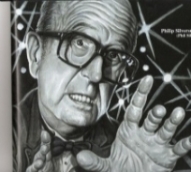
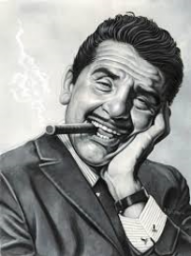
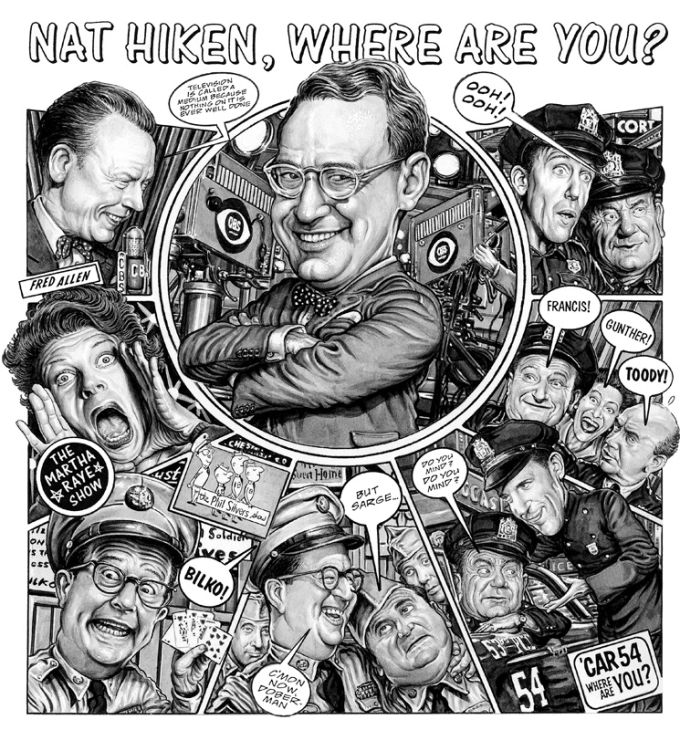
The Harvey Lembeck Comedy Workshop
In 1964 actor and comedic performer Harvey Lembeck was asked by Jack Kosslyn of the Mercury Theatre to take over the actors workshop. It was from this that Harvey founded The Harvey Lembeck Comedy Workshop. He developed a system of improvisational comedy workshops which he felt allowed performers to develop their comedic skills. "You can't teach an actor to be funny." he said "If the humour is innately there we will give him the tools and nourish his own abilities to grow."
Over the years many of todays most successful comedic performers and talents have passed through it's doors - Robin Williams, Penny Marshall, John Ritter, Scott Baio, Cathy Silvers and Kim Cattrall to name but a few.
Helaine and Michael Lembeck, both students of the Workshop, have enjoyed successful careers in showbusiness. Helaine enjoyed early success in Welcome Back Kotter and went on to appear in show such as Everybody Loves Raymond, Suddenly Susan and Malcolm in the Middle. As an actor, Michael has appeared in shows such as Happy Days, The Love Boat, Foley Square and Mad About You. Michael later became a full-time film and television director. He won an Emmy award for his work as a director on the Friends episode The One After The Superbowl. He has directed episodes of Everybody Loves Raymond and Veronica's Closet for television and his film work includes The Santa Clause 2 and The Santa Clause 3: The Escape Clause. He is currently working on Tooth Fairy starring Dwayne The Rock Johnson.
2010 marked the Workshop’s 45th anniversary and, under the direction of Harvey’s children, Helaine and Michael Lembeck, continues its traditions of nurturing and training the finest of comedic talent, always living up to the standards set by Harvey Lembeck over four decades ago.
The Harvey Lembeck Comedy Workshop has now become one of the major influences in the field of comedy, with students performing, writing, directing and producing some of the most successful productions in both television and film today.
Click on the link below to visit The Harvey Lembeck Comedy Workshop website......
http://harveylembeckcomedyworkshop.com
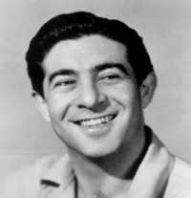
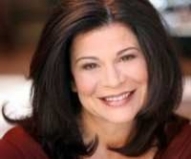
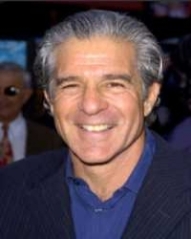
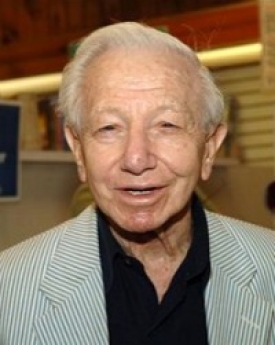
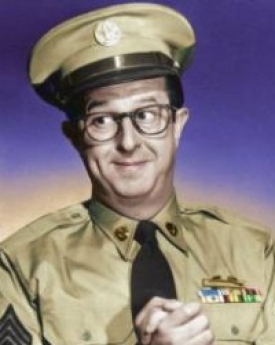
(The following is a personal tribute written by Mickey Freeman)
PHIL SILVERS: 1911 - 1985
On Friday, November 1, 1985 Phil Silvers died. This was the man who, as Sgt. Ernie Bilko, gave international status to chutzpah. In the college of con men he was the dean - an inspiration to every aspiring hustler.
When the Bilko show started I had seen Phil Silvers in many movies and had admired his hilarious professionalism in High Button Shoes and as the top banana in Top Banana. Bilko was the natural outcome of the many roles that Phil had played in his busy career. The character had two outstanding attributes: brass balls and the love of gambling.
We all know that Phil was a gambler in real life, but I didn't realise how long he had been training for this role. One night I was the after dinner speaker at a fund raising dinner for a local charity in Toronto. When the toastmaster introduced me as Private Zimmerman of the Sgt.Bilko show, I received a standing ovation.
"Gentlemen." I said "Wait til I say 'Good Evening!." A voice from one of the tables called out, "It's not for you - it's for Phil Silvers."
From different parts of the room people shouted "Phil bought my wife a fur coat."...."Phil sent my kid to College."..."Phil paid the mortgage on my house." I said, "I never knew how charitable Phil Silvers was!."
And then I realised that these men were among Toronto's leading bookmakers, and years before the Bilko shows, when Phil was working in local burlesque houses he would "share" his salary with them each week.
Silvers gambled in his personal life but in his professional life he left nothing to chance. Because of his long years as a burlesque sketch comic, the 'single take' and 'double take' were as natural to him as a mumble is to a method actor. His timing was as precise as a quartz watch.
Every new script needed a couple of new actors, and the most professional of them would be nervous because the regular members of the platoon were like a well-rehearsed repertory group. Phil had a standard reassuring speech for the newcomers. "You're doing great! Just say it fast - say it funny!."
I've worked shows where a performer would get a big laugh in rehearsal. Come show stime, the laugh was still there but it came out of the star's mouth. In one hundred and forty three shows, Phil never took a funny line away from another performer.
Phil Silvers died in his sleep. Had he been awake I'm sure he would've talked his way out.
MICKEY FREEMAN (Private Zimmerman)
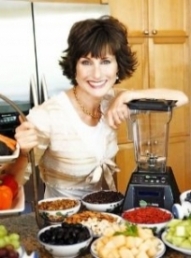
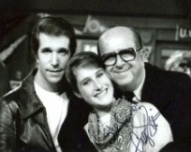
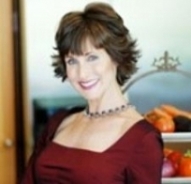
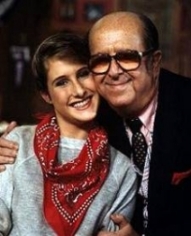
Cathy Silvers
Cathy Silvers began her professional working life as an actress back in 1980. Dudley Moore saw her in a production of The House Of Blue Leaves at California State University and was so impressed that he introduced her to his management agency. Cathy began attending auditions and following an audition for Garry Marshall was offered the role of Jenny Piccalo on Happy Days.
One of her proudest moments on the show came when she was given the chance to play opposite her father, Phil Silvers, in an episode entitled Just A Piccalo. "My dad made a guest appearance on one episode of Happy Days, playing Jenny's father. It was magic. I'd always heard people talk about how exciting it was to work with my Dad and I got to see why. He was really special. It was the only time we got to work together."
Cathy went on to make guest appearances in The Love Boat (1985) and Punky Brewster (1985). She landed the role of Molly Dobbs in Foley Square (1985) and worked alongside Harvey Lembeck's son, Michael.
Her last acting appearance came in Sgt.Bilko (1996) in which Steve Martin was cast as Ernie Bilko. "When I was filming Sgt.Bilko I had the feeling that my father was there watching over us. For me it was overwhelming to be part of something my father had created. It was as heartwarming as it was fun. With all due respect to Steve Martin he's just not my father. He was wise not to try to imitate what my father did. He created his own Bilko."
These days Cathy is happiest being both a mother and a successful businesswoman. Cathy runs her own company Cathy Silvers' Healthy Living and has transformed her passion for healthy living into a thriving business. She has also written a successful book Cathy Silvers: Happy Days, Healthy Living in which she charts her time on Happy Days and the important changes she has made to her living and lifestyle since the show finished.
"I'm speaking pretty much all over the country now about being healthy, about a green planet and drinking green smoothies so you can have a greener, healthier life and body." says Cathy.
"Thanks for all you do for Daddy! Much Love, Cathy."
Cathy sends this message to all Phil-fans everywhere!
"I love your website and we are so happy to see such love and affection shared for our Dad. He was such a brilliant talent and a wonderful man.
The first half of my book, Happy Days, Healthy Living, is largely devoted to Dad and his career and my life with him on and off the sets of Hollywood. When he played my father Roscoe Piccalo on Happy Days, this was one of the greatest times of my life.
When he walked onto the set, the cast and crew and producers and writers all just fell silent in his presence. To see Henry Winkler, Garry Marshall, and Ron Howard all just stand in awe of him was a moment in time I will never forget. We all love and miss our dear Phil."
Cathy's book Happy Days, Healthy Living is available to purchase by clicking on the following link...
Hank Garrett
Kliph Nesteroff is a writer. A regular contributor to WFMU's Beware of the Blog and CBC Radio. He's been cited by Vanity Fair, The Guardian, The Globe and Mail, Salon, BoingBoing, Comedy Central etc. He hosts Generation Exploitation Podcast and is a regular on various radio stations around North America. He recently interviewed Hank Garrett. Former wrestler Hank played Officer Nicholson in CAR 54, WHERE ARE YOU? and has since gone on to co-star in numerous films and television shows alongside the likes of Peter Falk, Patrick Stewart, Al Pacino, James Coburn and Kirk Douglas.
Kliph Nesteroff: When did your nightclub act start?
Hank Garrett: I've always been a clown. I started in the Catskills when I was sixteen. I started working these hotels up in the Catskills but I was also very much involved in working out. I was a power lifter at the gym. I broke the New York state record at one point. A gentleman had approached me and said, "You know, you could make a lot of money as a professional wrestler." He represented a guy named Toots Mondt. Toots Mondt was a promoter in New York. Met Toots Mondt [and] started professional wrestling when I was seventeen. I am now in The Wrestling Hall of Fame. They changed my name to Hank Daniels, The Minnesota Farm Boy. I'd never been out of New York!
Kliph Nesteroff: (laughs)
Hank Garrett: I didn't know anything about Minnesota. I didn't know what a farm looked like. They shipped me off to California and they dyed my hair blonde. I wrestled as Hank Daniels, The Minnesota Farm Boy for a while in the WWO, The World Wrestling Organization. I was trained by a guy named Bibber McCoy who was a pro wrestler. He was my mentor ... When I came home, my mother did not know that I had gone out to California to be a wrestler. She thought I had gone out there to be an actor. I came home and I was up to two hundred and sixty pounds. She saw the blonde hair and she opened up my suitcase; she was helping me unpack. I had a fan club and the youngest member was about one hundred and nine. Little old ladies made my wardrobe. Hand sewn. Spangles and beads and fringes. My mother pulled out this jacket and it was all spangled and she looked at this blonde hair and she went, "Oh, my God! Tell me the truth!" I said, "What?" She said, "Are you a communist!?" (laughs)
Kliph Nesteroff: (laughs)
Kliph Nesteroff: At what time did you move from wrestling to acting? Were you doing them both simultaneously or did you quit wrestling and commit to show business?
Hank Garrett: Because of Nat Hiken ... There was a comedian named Mickey Deems. His wife was Nat Hiken's secretary. I met Mickey up in the Catskills when I was doing my act. He said, "Gertie has set up an appointment for you to see Nat Hiken. He's doing a series called Car 54, Where Are You? Would you go in?" Show you how bright I am, I walked in and I spoke to Nat Hiken. He said, "Okay. You're Ed Nicholson." I said, "No, no. I'm Hank Garrett." He said, "No, idiot! Nicholson is the character you're going to play on Car 54." He introduced me to Al. He said, "Al Lewis? This is Hank Garrett. The two of you are going to be partners on the show." And that's how it started for me. But I had to sign a contract, a release, that I would not wrestle anymore because if I got hurt it would hold up production. But I did anyway. I went back and wrestled a couple times as "Hank Star." Nat found out about it though, and he said, "Hank don't do this. Please." I said okay and that was the end of my wrestling career.
Kliph Nesteroff: Nat Hiken was a wonderful writer and is underrated today. What kind of a guy was Nat Hiken?
Hank Garrett: Oh, he was amazing. Nat would walk on the set, look at the set-up, and say, "I don't know. I don't know. Tell you what..." And he would make the changes right then and there and the changes were [always] for the better. He was amazing. Just an amazing guy. Very soft spoken. Just incredible. We would laugh all the time.
Kliph Nesteroff: Were you familiar with Nat Hiken at all before?
Hank Garrett: I watched the Bilko show, of course. That's how Joe E. Ross got his start. They cast Joe E. on the show as the cook. Nat liked him and wrote [Car 54 Where Are You?] for Joe E. [Ross] and Fred [Gwynne] and for Al [Lewis] and myself.
Kliph Nesteroff: What kind of a guy was Joe E. Ross in real life? Was he as gruff...?
Hank Garrett: (laughs) Yup. Yeah. He was a knockabout comic. Burlesque. Not even burlesque. He was just a dirty comic. To give you an idea: When the show became successful, a bunch of us came out to California. Joe E. Ross went to Sy Devore and got this beautiful suit. At that time they had barbers at Sy Devore's. They shaved him. They restyled his hair. Next day Joe E. had to dress himself. So he had a pair of sneakers and this suit on and the button was in the wrong buttonhole and there was foodstains all over it! And Sy Devore ran into him and said, "Oh my God! Joe, give me back the suit. I'll give you back every penny that you paid for it." Ross said, "No, no! I love this suit!" Devore said, "Then sell me the label. Please don't tell anyone it's a Sy Devore suit!" That was Joe E. Ross.
Kliph Nesteroff: (laughs)
Hank Garrett: At Gold Medal Studios, where we shot in the Bronx, we had a little cafeteria. You [ate] whatever you wanted and [then] you told the cashier what [you had eaten]. So, I [tell the cashier] I had a tuna fish sandwich and a coffee or whatever it was and the cashier says, "Three bucks." Joe E. Ross would walk up and he didn't have to say a word. They looked at his clothes and they said, "Okay. You had the cottage cheese and the scrambled eggs." It would be all over his uniform. He was quite the slob.
Kliph Nesteroff: We should talk a little about Al Lewis.
Hank Garrett: One time we were on a break and we walked over to a little Italian grocery [in Car 54, Where Are You? wardrobe]. This was in The Bronx. We walked in and were going to grab a sandwich. So Al asked for a ham sandwich. And this guy just kept slicing and he said, "Sure, what else ya have?" "Well, a Coke." "Sure, officer. Have anything you want!" Al reached into his pocket for some money and the guy says, "Oh, no, no, officer! You no gotta pay!" I said, "Al, pay the guy. Let's go." He said, "He won't take the money!"
Kliph Nesteroff: When you were working together - was Al opinionated, politically, at that point?
Hank Garrett: Always. He had an opinion about everything. He would tell you how to stand. He would tell you [where to put] the camera. There was one time - Al and I were in the car. Al was deaf in one ear. I had an ear infection. And we're sitting there, the lights are on, and they say "Action!" We couldn't hear the "Action." The two of us are sitting there staring. They just kept yelling action. Finally, Nat Hiken came over holding a big sign that said "Action." I went to Al's home a few times [and met] his wife and kids. Then his wife was in a horrendous automobile accident. Sweet, sweet, sweet lady.
Kliph Nesteroff: Was he much of a teller-of-tall-tales by that point?
Hank Garrett: Al? Oh, yes. (laughs) He was a scout for a basketball team... oh yeah, oh yeah (laughs). Kliph Nesteroff: It is hard [for me] to write an article about him, trying to separate fact from fiction because he told so many stories.
Hank Garrett: Oh, I know. My God.
Kliph Nesteroff: And so many of them contradict each other.
Hank Garrett: (laughs) That was Al! He talked about having this Galapagos turtle in his room. I said how did you get a Galapagos turtle in [your room]? They weigh in excess of four hundred pounds. He said, "Well, a friend of mine left it." (laughs). Amazing guy. Amazing guy. Constantly running for office and then involved in the restaurant Grandpa's.
Kliph Nesteroff: Did you know that Fred Gwynne was the one who designed the [logo for] the menu [and awning] at Grandpa's? It was a drawing that looks like Grandpa Munster and it was Fred Gwynne's artwork.
Hank Garrett: Oh, I didn't know that. Fred was fantastic. He put out several children's books with his drawings. Just marvelous.
Kliph Nesteroff: Any final thoughts on Al Lewis?
Hank Garrett: I miss him. He was fun, fun, fun. A fun guy to be with. His stories were amazing. Most of them weren't true. But we had an incredible time together.
To see the rest of the interview in full simply click on the following link....
http://classicshowbiz.blogspot.com/2010/05/talk-with-hank-garrett-may-17-2010.html
(Interview excerpt reproduced by kind permission of Kliph Nesteroff)
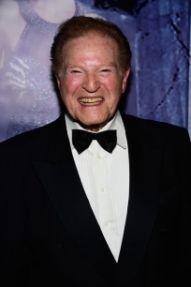
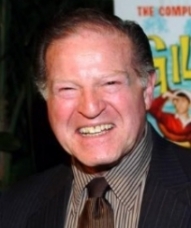
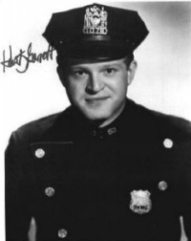
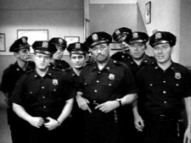
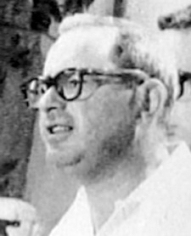
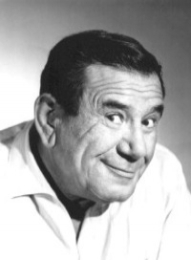
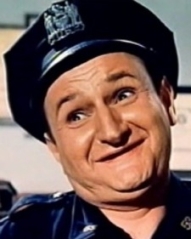
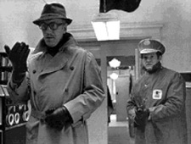
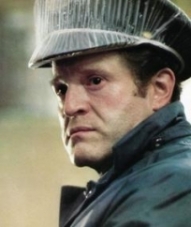
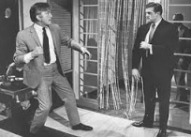
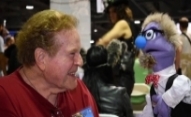
Al Lewis - The Interview
In late 1985 I had the opportunity to talk to Al Lewis. I'm very proud to say that I became friends with him.
It is well-documented that Al loved to embellish and exaggerate the stories concerning his life and career. However, for me personally I am sure of one thing - he was a warm and welcoming friend who always had time for me. Over the years we spoke about many things; sport, life, politics, family and of course his career.
I first interviewed him in 1997 and once again in 1999. We conducted the following interview over several telephone calls and I am proud to reproduce excerpts from those sessions.
Ladies and Gentlemen...Mr Al Lewis!
Al, where and when were you born?
I was born in New York in 1913....April 30th..but don't hold me to it! (Al was actually born in 1923)
Do you have any memories of your childhood days?
Sure....they were tough. We were poor, we had no money so I used to run with gangs and we'd steal food...sometimes money. I did what I had to do to survive.
What made you want to get into showbusiness?
As a kid I used to sneak into theatres and movie houses and it was like magic. I quit school and joined a circus and learned the trapeze, then I became a clown! I did pretty much every job in the business working my way up learning every bit of schtick I could.
You eventually found work in vaudeville and burlesque houses.....
Yeah! I met some great ladies...brassy but fun. I did bits of comedy business inbetween the girls takin' off their clothes. You had to be fast and loud...if you hung around too long the schmucks in the audience would kill ya! That's when I first met Phil Silvers too! He was already on the up by then!
Can you recall your first television appearance?
I was doing all sorts of stuff...Studio One, Armstrong Theatre...just a line here, a one-shot there. I got a call from Nat (Hiken) who I'd known since we were kids. He gave me slot on a couple of the Bilko shows. Then I went to work again with Phil on Broadway in Do Re Mi. A lot of fun...great days! Phil was a good guy...and one of the most professional comics I ever worked with. Great timing and a real one-off!
How did your involvement with Car 54, Where Are You come about?
Well....I was in Do Re Mi and Nat came to see the show. He asked me to do a couple of shows...in one I was a construction worker and I also played a crook in another. When the shows went out on air I was a big hit. I had this face and this voice that people liked. Nat came up with the part of Leo Schnauser for me and that was it. I was in. It was a good show and a good part. I knew Joe E Ross from the business...Fred I didn't know really yet!
You then went on to score your greatest hit with The Munsters...
That's right. I signed for the show after Nat's attempt to write me my own television show bombed. Fred and I became friends on Car 54 so when I knew he was involved that clinched it for me. They flew me out to LA, put me in a fancy hotel....the money was good and I got to work with Fred again.
There must've been a lot of preparation....costumes, make-up etc before you could begin filming?
Sure. My make-up was okay...no problem....I just hated the waiting round in the make-up chair. Sure, we had to get to the studio early. But poor Fred suffered terribly. The padded suit was very heavy and the headpiece used to hurt him like hell. He sure suffered for his art. When we shot the first couple of show they had me wear a false nose. Schmucks....the last thing I needed was an extension.
You and Fred became great friends as a result of the show....
Fred was an odd bird but I loved him. We talked, laughed, enjoyed a cigar and had great fun on and off-set and I can tell you those four years on Car 54 and The Munsters were some of the happiest of my life. Fred was a complex man but he was my greatest friend. I loved him and I miss him.
You worked with Terry-Thomas in Munster Go Home.....
Terry was another one-off. One of your greatest comic actors ever. He was a big hit in Hollywood. He was the only actor I ever worked with who was the same off-set as he was on screen. What you saw up there on the screen was exactly how he was in real life. A great fella. Tragic how he ended up.
Were you disappointed when The Munsters was cancelled?
No. We had two great years.....made some great shows and it was time to move on to the next job. It was a relief for both me and Fred...that make-up was a pain in the f****** ass! Fred for sure was glad to leave Herman behind.
Bearing in mind all the problems with make-up etc, why did you and Fred agree to return for The Munsters' Revenge in 1981?
Easy. Money. Pure and simple. They wanted to get these two old farts back together after all those years, so me and Fred asked for crazy money thinking they'd say no. But they said yes and that was that. Once we were in costume and filming it was like we'd never stopped. We had a ball shooting that one and the beauty was we didn't give a damn if it went to series or not.
How did Grampa's, your restaurant, come about?
I saw a chance to make some good money. Fred did all the artwork for the logo, menus etc with a play on my Munsters character. Hell they were all doing it so I thought why not embrace my past and make some money from it too. I would go down and welcome people to the restaurant...people would come to talk to Grandpa and it was a big success. I loved it...loved meeting people and giving something back. We closed it in 1993...but we had a good run.
You once told me you were a big fan of Benny Hill....you actually got to work with him didn't you?
Oh sure...I loved Benny....watched his show on TV all the the time. Loved him. A funny, funny man. Reminded me of the old-time greats like Chaplin and Keaton. He could make the smallest piece of business look funny. I once did an open air thing at Daytona Beach with him. He knew a lot of the old vaudeville gags....we knocked up a bit of business and we killed those kids. They loved him. He was a sweet, sweet man.
So when you're not acting what do you do?
I do radio....I have a little radio show. I have a kids TV spot that I do. I love making personal appearances....meeting the fans. I also love sport....basketball, football, baseball...you name it. I even scout for the NBA. If I never work again in the business now I wouldn't care. I've had a great time and there's a couple of things I've done that mean something...but hell most of 'em were just jobs to bring in the money.......
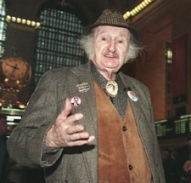
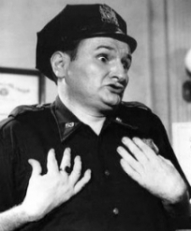
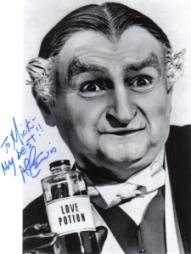
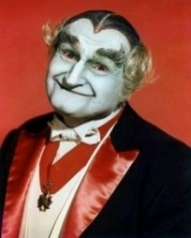
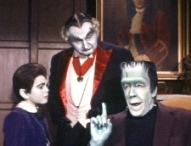
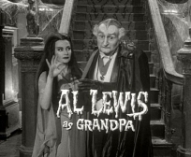
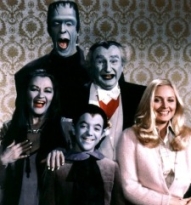
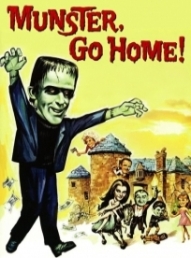
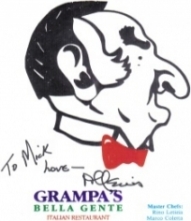
The Dick Cavett Show
Back in 1971 James Mullholland had the privilege of witnessing the taping of The Dick Cavett Show with guests Phil Silvers and Jack Benny. Here is the story in James' own words.....
"I once sat in the Green Room of The Dick Cavett Show and listened to Jack Benny and Phil Silvers bicker and banter for a delightful 20 minutes or so. I remember the exact date - April 1, 1971 - because Jack asked Phil, "Is today April Fool's Day?" And Phil shot back, "Yeah, Jack, that's why I said you're talented."
I was a young writer on the Cavett Show at the time and idolized Phil. He and Jack were both guests that night so I just planted myself on the couch and watched them before the taping started.
I was much too shy to approach Phil Silvers. Just being in the same room with him was a major thrill for me at the time. I remember he was practicing on the clarinet while kidding Benny. You could tell they were close friends."
During the interview, Jack Benny recalled that he had advised Phil not to move into television. Phil ignored Jack's advice and then went on to win numereous prestigious awards for his portrayal of Sergeant Bilko in The Phil Silvers Show. Jack claimed he never won any of those television honors.
Host and presenter Dick Cavett actually appeared in The Phil Silvers Show. He was an autograph hunter in the episode entitled Bilko's Godson (1959).
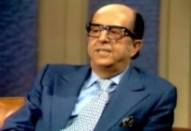
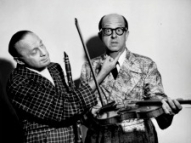
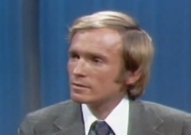
"Mad World" Memories
The following interview by Mark Evanier, took place in 1982. Phil recalls his experiences of working on Stanley Kramer's 1963 comedy masterpiece, It's A Mad, Mad, Mad, Mad World.
"It was a great honor. Everyone wanted to be in it. Stanley Kramer? Spencer Tracy? No one turns down being in a movie with them. Plus, the idea was to include all the great comedians in Hollywood, so everyone wanted to be in it. I knew comics who said, 'They wanted me but I turned it down.', but they were lying. Nobody didn't want to be a part of it. Even when we were out in the desert and it was 120 degrees in the shade, no one said, 'I wish I hadn't agreed to do this picture.'
The best show was off-stage. Jonathan Winters carrying on. And Milton Berle and Mickey Rooney. Everyone had stories. We used to drive each other crazy. Like with Berle, he was always trying to steal the scene, get a little extra. If there was a scene where he didn't have a line, he'd be trying to insert something.
One time, I let it drop that Stanley had invited me to view the dailies. That wasn't true. Stanley didn't let anyone see the dailies. He couldn't. He already had too many stars, too many egos to deal with. But I let it drop that I was seeing dailies and I told everyone, 'Watch. In ten seconds, Berle will be on the phone to his agent yelling about, 'How come I don't get to see dailies?' So I told him and sure enough, ten seconds later...'How come I don't get to see dailies?'.
I almost got killed twice during the filming. Well, not exactly killed. But they had this scene where I ride my car down into the river and it sinks. I thought the stuntman was going to do it but Stanley said, 'No, your reactions are what will make it funny,' and he was right, of course. The car was on pontoons or some sort of raft, so they could lower it like it was on an elevator. There were — what do you call them? Guys in suits with tanks? — frogmen there to pull me out because I can't swim. I almost drowned but it was a great gag. I didn't want them to cut it. The same thing happened with that film I did for Disney, The Boatniks. I swim now but I didn't swim then. What I'll do for a laugh. I almost drowned, both times.
The other time in Mad World, I actually did get hurt. I had to run after Spencer Tracy and I pulled a muscle in my groin. It hurt like hell and I was out of commission for three or four days. Every day, they're calling and asking, 'Can you come back? It's just a close-up, no movement.' I didn't want to screw up the film so I came back. It was agony but I did it. If it had happened to Berle, he'd never have missed a day of shooting.
I wore this suit and tie throughout the whole movie. Actually, it wasn't the same one. They kept getting ruined. I think we had five or six when we started and finally, the last week of shooting, we were down to one. No, wait. They started with ten or so because the stuntmen were always destroying them. The wardrobe people kept saying to me, 'Don't ruin this one.' I don't know why. It was just a plain, off-the-rack men's suit. I could have gone into any men's store in L.A. and bought ten more exactly like it. But everyone was worrying that I'd ruin my last suit so they wouldn't let me eat lunch in it. There were some other actors who were in the same situation.
Sid Caesar and Edie Adams had these clothes that were all torn and stained with paint so they couldn't even be dry cleaned, and there were several duplicates of each. But they weren't as worried about running out of them as they were about me ruining my last suit.
I loved working with Spencer Tracy. We had a couple of scenes that got cut. I loved working with all those comics. Buster Keaton was there but I didn't really get to know him until we did A Funny Thing Happened on the Way to the Forum in Spain. I spent most of my time with Berle and Ethel Merman. They were like an old married couple, yelling at each other. Jonathan Winters...God, to watch him just improvise. I improvise all the time but he kept turning into different people, making different sounds. The only guy I never really got along with on the set was Dick Shawn. Strange guy. Very talented but it was like he was speaking some other language.
Kramer didn't have to direct me much. I played the same Bilko I always played. I could have done it in my sleep, except that you couldn't sleep with all those comics around. Buddy Hackett — I used to call him "The Bear" — said, 'Blink and you lose your position.' No one was stealing scenes or catching flies but if you weren't at your best, they were ready to pounce and move in. You know what "catching flies" means?
'Catching flies' is what we used to call it in burlesque when another comic moved on your line or did business. You're trying to talk and he's doing something — maybe even pretending to be catching flies — to get the audience's attention away from you. Berle was the master at it and also the toughest taskmaster when he caught anyone else doing it. Kramer didn't let us do any of that. Sometimes, he'd say, 'It won't match.' Whatever you wanted to do, he'd say, 'It won't match,' but he wouldn't explain why.
It was probably the best movie I was ever in. Maybe Cover Girl was better, I don't know. But I know we all felt like something, like it was really something special. I would've been crushed if they'd left me out."
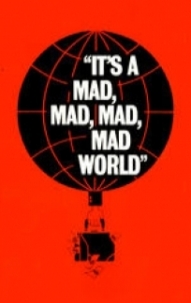
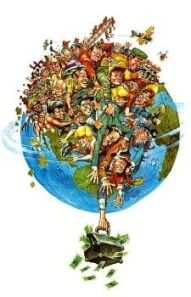
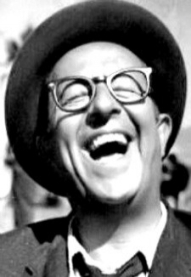



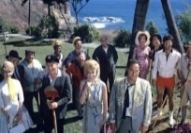
Phil & Frank...
Phil Silvers and Frank Sinatra became close friends in the early 1940's. It was Frank, along with Gene Kelly and Bing Crosby, who became one of Phil's 'sponsors' in Hollywood. It's well documented that having left Broadway to pursue a Hollywood career (following an offer of a contract from Louis B Mayer) Phil struggled to find suitable film work.
It was whilst going through this difficult period that this circle of friends threw lavish parties where Phil mixed with the Hollywood elite and performed his shtick. "It was great for me! I was ready to pack my bags and go back to Broadway." said Phil. "Frank, Bing and Gene looked after me. They saw I always had money in my pocket and food on the table! I never forgot what those guys did for me!"
Phil and Frank completed several tours of duty together on the USO tours of WWII. Phil taught Frank many of the old burlesque routines which they eventually performed to huge success in front of many a receptive audience. "It wasn't easy when we first started. The GI's hated Frank. They thought he was stealing their girls' attentions at home." said Phil. "I knew I had to make Frank the underdog. So I made him the butt of my jokes and it worked. By the end of a show the whole of the audience were rooting for Frank!"
Phil, along with composer Jimmy Van Heusen, even wrote a song for Frank - which went on to become one of Frank's most popular hits, 'Nancy, With The Laughing Face'. When they returned to the US following a tour of Italy, Frank made a gesture that affected Phil deeply. When Rags Ragland, Phil's close friend and one-time partner, was taken ill, it was Frank Sinatra that made sure that Rags received the best medical attention available.
"Frank intervened with an important specialist, who immediately put Rags into Cedars Of Lebanon hospital." said Phil. "This doctor told me that I could not expect a miracle - He will not leave this hospital." Sadly the doctors' diagnosis proved true and Rags passed away on August 20, 1946 with both Phil and Frank at his bedside. Within days Frank came to Phil's rescue once again.
Phil and Rags had been booked to play at the Copacabana. Having learned all the routines whilst performing on the USO tours, Frank stepped in for Rags. Phil was so touched that he wanted to thank Frank in some way.
The following story of Phil's gift to Frank Sinatra is presented courtesy of Tony Oppedisano:
"When planning for the USO tour, Silvers taught Sinatra several burlesque numbers he had perfected with his comedy partner, Rags Ragland. The two then played the bits to great acclaim, especially "My Buddy": Frank enters, singing "My Buddy" ("Days are long since you went away...");
Silvers interrupts, enveloping Sinatra in a big bear hug while exclaiming, "Yes, my friends, there is no truer love than the love between a man and his friend! Yes, you heard me, I said love! I am not ashamed to say I love this boy!"
Silvers follows that up with a big kiss, which gets a "look" from Sinatra, who then starts the song again from the top. Silvers cuts in again, with, "Yes, my friends! I'll shout it from the rooftops! I am not ashamed of my love for this boy! This is a good boy, and I love this boy! I, Phil Silvers, love this boy!"
Another big kiss and a big smile from Silvers. Sinatra stares at him, waiting, and then starts the song again: "Days are long since you went away...", still waiting. Silvers just stands there, smiling, with Sinatra watching warily. Then, the payoff: Frank grabs Phil and plants a big kiss on his cheek.
In 1946, just a short while after Silvers and Sinatra returned from the USO tour, Phil Silvers and Rags Ragland were booked at the Copacabana. When Rags suddenly fell ill, Sinatra made sure he was admitted to Cedars Hospital. When Rags passed on, Phil and Frank were by his side. Though distraught, Silvers was a showbiz trouper and went to New York for the shows at the Copa.
The first night of the booking, as he sat in his dressing room wondering what to do, Silvers heard the door open - and a voice. "Hi. What do we open with?" Sinatra, in the middle of a movie shoot in California, had flown to New York to be with Silvers on opening night. The two proceeded to do the old burlesque routines, including "My Buddy."
At the end of the night, Silvers took a bow for Rags. Phil Silvers knew not to thank his friend, not to gush over the gesture or cry on his shoulder, but he needed to show Sinatra how much he loved and appreciated him.
The lighter he had customized for Frank is engraved "FS" on the top and has the opening bars to "My Buddy" picked out in silver musical notes accented by diamonds and sapphires. More valuable then the gemstones, though, is the inscription in gold: "I'm not ashamed of my love for this boy - Phil."
Interestingly Phil recreated the "My Buddy" sketch in 1968 for The Dean Martin Show - with Dean stepping into Sinatra's shoes.
In the ensuing years Phil Silvers and Frank Sinatra maintained a close friendship, socialising and reminiscing when they could, about the old days. Sadly their relationship broke down in 1956 when Sinatra, who was then appearing in his own show on ABC television, took it as a personal affront when CBS switched Phil's show (The Phil Silvers Show) to a slot in direct opposition to his own show.
"I went to see his show in Miami." said Phil, "Frank introduced all his friends in the audience, but not me. I was sure he didn't see me. A woman persisted in pointing me out to Frank until he eventually introduced me, coolly and impersonally. After what we'd been through I was hurt." Sinatra was convinced that Phil had a hand in the network's decision to put the shows in direct competition against each other. "I did not hear from Frank again for sixteen years." said Phil.
Fast forward to 1972. Phil was in hospital recovering from the effects of a recent stroke. "A giant red balloon arrived with the message 'I know this will give you a lift!'" said Phil, "And the next day, a wire: 'We're all praying for you....Positive you'll be fine in good time. Love, Frank Sinatra!'"
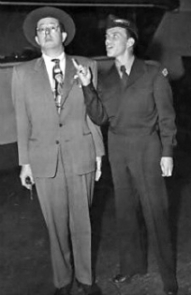
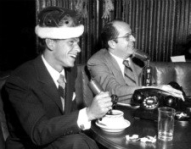
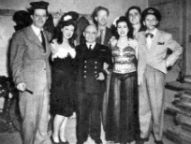
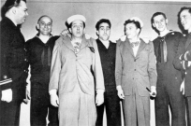
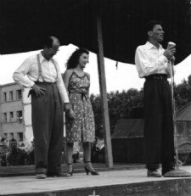
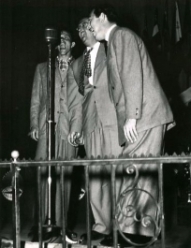
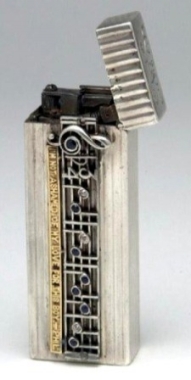
Mickey Joseph
Mickey Joseph is a comedian, impressionist and actor. He spent much of his early life in San Francisco. From an early age he displayed a talent for performing and mimicry. His huge repertoire of impressions covers everyone from Woody Allen to Jack Nicholson. He is currently appearing in Las Vegas as Joey Bishop in The Rat Pack Is Back. The show faithfully re-creates the songs, the banter and the atmosphere of the Rat Pack at the height of their popularity.
As well as being a fan of the great Phil Silvers, Mickey is also renowned for his superb impression of him. He once played Phil in a Dean Martin Celebrity Roast in Hollywood. Whilst continuing to work in Las Vegas, Mickey also has plans to develop a stage project about Phil Silvers. He recently took time out from his busy schedule to give us the following interview:
Mickey could you tell us a little about your background?
I'd been performing standup comedy in San Francisco for twenty years. I raised two children as a single parent and wrote a book about combining show biz with parenting. The book is called WHAT WOULD DON CORLEONE DO? I published it myself in 2005. Now I live in Las Vegas where I play the sour faced comic Joey Bishop @ 7:30 every night in the stage production The Rat Pack is Back! It is a great show...they say one of the best in Vegas. Then I drive to Hooters Hotel and Casino and perform in The Dirty Joke Show @ 10pm. I am very fortunate two have two steady gigs in this town.
When did you realize you had talent for impersonating people?
When I was a kid I was surrounded by Croations and Italians so I was aware that people talked differently. I would imitate my Grandma, and my parents would laugh thier asses off. By fourth grade I had a pretty solid repitiore of voices like Howard Cosell, Mohamed Ali, my Uncle Adam, Marlon Brando, John Wayne, and Walter Brennan.
What were your favorite shows as a child and did they have any influence on you developing your talent as an impressionist?
Lost in Space, Gomer Pyle, Gilligans Island, The Dean Martin Show, The Flip Wilson Show, all these shows had characters that I could imitate. My biggest influences as a comic however are Lucille Ball and Red Skelton, both great physical comics. And physicality eventually became my forte as a performer.
Who were your idols whilst growing up?
I had many. My father, The Beatles, Johnny Carson, Ali, Bobby Kennedy, Bill Cosby, Willie Mays, Jonathan Winters, Paul Newman, Red Skelton, Lucy, and of course....Phil Silvers.
Can your describe your first venture into show business?
I guess going way back it would be the spook houses that we created in our garage on a Saturday afternoon. My cousins my brother and I would charge kids a nickel to come in and we would scare the crap out of them. I realized then that I had talent as an actor.
Did you hold down any regular jobs whilst trying to break into showbusiness?
Sure, when you first commit to life as a performance artist you must pay the bills as well. I waited tables, taught traffic school, delivered meals to senior citizens, street mime, delivered balloons dressed in a gorilla suit, painted houses. But not anymore. Now it's all about walking out on stage every night.
Have you done any tv or film work?
Several independent films shot in and around San Francisco. Also , I performed my standup act on television a few times. But nothing big. I never really applied myself in Los Angeles too much. I was too busy raising two kids and successfully bouncing around the clubs in the bay area. There we're nine full time comedy clubs there in the nineties and I worked all of them.
Your list of impressions is amazing, do you have a particular favorite? And also is there one particular impression that you can pull out of the bag to get the audience on your side?
I always love doing obscure impressions. It was Phil Silvers in the eighties. He was my big impression that everyone talked about. I did Jerry Lewis in Brazil. Sidney Portier ordering breakfast. Bruce Dern as Wally Cleaver, Stevie Wonder singing the Christmas Song. Hoss Cartwright having a wet dream. And Jack. My impression of Jack Nicholson is the one that wins the audience over almost every time.
How did the impression of Phil Silvers originate?
The physical resemblance was fully developed by my early thirties. They call it male pattern baldness.The glasses really put the look over the top. They have to be the right glasses. A heavy frame that pushes the tips of the ear out slightly. Bilko's voice I could do since high school.
Were you a fan of The Phil Silvers Show?
Absolutely. In 1974, when I was 16 years old, they we're showing Bilko re-runs at 11pm every night. And everyone I knew in school was staying up to watch him. The next day in school we would talk about how great the show was. He kind of became a cult hero to us. It was Bilko at 11. The Honeymooners at 11:30 and McHales Navy at mid-night. What a line up of classic television comedy. Really some of the best nights of my life.
You seem to have paid great attention to detail regarding the Bilko uniform, was it made especially for you?
I received a poster of Bilko as a birthday gift from Tracy Foreseer. She was my manager at the time. We have army surplus stores here where you can pick up everything that you could possibly need to create the look of a 1950's Master Sergeant. When I put it all together, it was a mind blower.
When you start with an impression is it the voice that comes first?
Yes for me, it is the voice that comes first. But the character's attitude runs a close second. I somehow manage to internalize each character. It doesn't help to look in the mirror. For me it all comes from deep inside.
Have you ever had any negative reactions from any of your 'victims'?
No, I have never met any of my victims. Friends of victims yes. In Oakland California one night, After closing my set with my Stevie Wonder impression, this huge black dude comes up and says, "Hey man... I'm a personal friend of Stevie Wonder man." I thought, 'Holy shit, here it comes'. He said, "That's the best Stevie impression I ever seen." Pretty fly for a white guy. And I thought he was mad.
You're currently appearing in Las Vegas as Joey Bishop in the Rat Pack is Back! How did that project come about?
The show has been running here for 10 years now. We present what these cats did on stage during the 1960's. I joined the company five years ago and have been full time, that is every night for about eleven months now. It's a gasser. I get to tape hair onto my head! I have been on the road with them to 62 cities here in the States and Canada. The road shows are always big crowds in beautiful theaters. I'm having a blast with these guys.
Any interesting projects in the pipeline?
Yes... I am currently tossing around ideas for an off Broadway Show called...you guessed it....BILKO! It's a day in the life of Phil Silvers and his cast and crew as they actually shoot one of my favorite Bilko episodes. Its a show day. Of course I have to get permission from the Phil Silvers estate before I begin to bury myself in this creation. Who knows, it could happen. This could be a smash in New York or London. With yours truly at the helm.
Any message you'd like me to pass on to the members of The British Phil Silvers Appreciation Society?
Thanks for honoring a very funny man. And to any of you who may have had the pleasure of knowing him...I'm jealous. Being a friend of Phil Silvers must have been the best.
For more information on Mickey, to purchase a copy of his book or to visit to his website. Simply click on the link below:
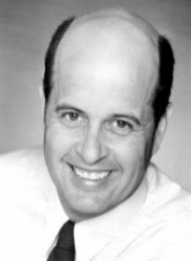

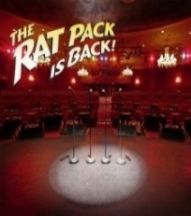
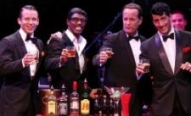
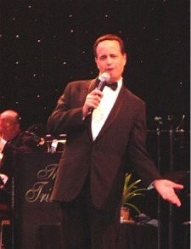
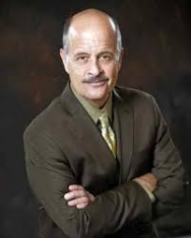
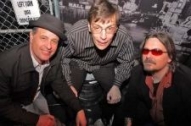
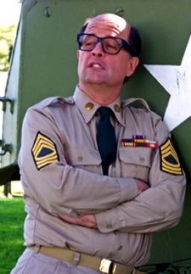
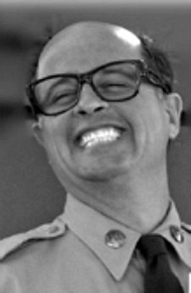
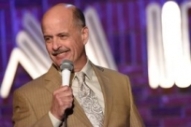
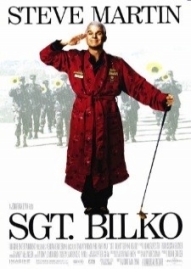
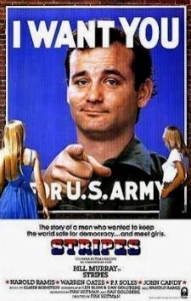
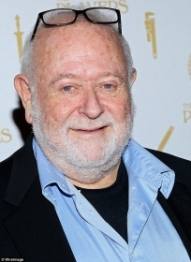
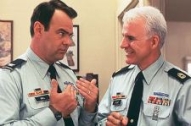
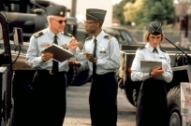
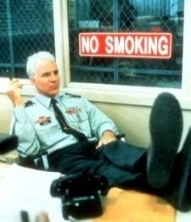
Sgt.Bilko - The Movie
'Sgt. Bilko' is one sure bet to tickle your funny bone! Steve Martin, Dan Aykroyd and Phil Hartman are three reasons why this is one funny film." This was critic Howard Benjamin's summation of the 1996 release of Steve Martin's appearance as Sgt. Bilko in the big-screen adaptation of The Phil Silvers Show.
Universal Studios, in particular, felt there was an appetite amongst modern -day audiences for big-screen re-makes of popular TV series of the past. The trend had begun in Hollywood the mid 1980's with a big-screen adaptation of Rod Serlings's The Twilight Zone. It proved very popluar with US audiences and further adaptations included Dragnet, The Untouchables, The Addams Family, The Fugitive and The Beverly Hillbillies.
A Sgt. Bilko re-boot was first muted in the early 1980's. Bill Murray had scored a huge hit in the US Army comedy Stripes (1981) and he was approached to take on the mantle of Sgt. Bilko. He passed on the project, saying "There's only one Ernie Bilko!" in defference of course to the master.....Phil Silvers! Eddie Murphy and Robin Williams were also considered as possible candidates but the project was eventually, and wisely, consigned to development hell.
1995 saw the 40th anniversary of The Phil Silvers Show's debut on US television. Universal Studios felt that the time was right for a big-screen re-make and secured the services of comedian Steve Martin to help bring the mis-adventures of Sgt. Ernie Bilko to a new audience.
Jonathan Lynn was hired to direct the film. UK-born Lynn had served his apprenticeship as both actor and writer on UK shows such as On The Buses and the hugely popular Doctor series. He'd also enjoyed film success with the likes of Clue (1985), Nuns On The Run (1990) and My Cousin Vinny (1992).
It was felt that Steve Martin was the perfect choice to resurrect Ernie Bilko. Fellow Saturday Night Live alumni Dan Ayckroyd and Phil Hartman were cast in the respective roles of Colonel Hall and Major Thorn. Actress Glenne Headly was hired to play Bilko's love interest, Rita Robbins.
Writer Andy Breckman, whose previous credits included work on both Saturday Night Live and The David Letterman Show, was hired as scriptwriter. It was rumoured that Breckman watched numerous episodes of the original show and indeed the finished film includes several direct lifts from Nat Hiken's original scripts.
Breckmans' script saw the camp shift its' locale from Kansas to California. Ernie was given a nemesis in guise of Major Thorn (Phil Hartman) and his love interest was no longer Joan Hogan but Rita Robbins. Corporal Barbella also underwent an inexplicable sex-change.
The film was released on March 29th, 1996. It received a mauling from both audiences and critics alike.
Whilst there was no doubting Universal's genuine attempt to give the film every chance to succeed - proven actors and comedians, a director with a good track record, a writer who had worked on two of television's most popular shows and a $30 million + budget, the film had a serious flaw....it's lead actor.
By the mid '90's Steve Martin was America's comic sweetheart. He'd enjoyed great success, initially on television and latterly in films such as The Man With Two Brains, Dead Men Don't Wear Plaid, Dirty Rotten Scoundrels and Planes, Trains and Automobiles.
However, the stark truth was that his portrayal of Sgt. Bilko was both unconvincing and, more importantly, unfunny. He seemed uncomfortable and unsure of the character. In subsequent years Steve Martin has distanced himself from the project, acknowledging that it was an impossible task trying to fill the shoes of Phil Silvers.
That is not to say that the film did not have it's merits. Dan Ayckroyd proved to be an affable and likeable Colonel Hall. Phil's daughter Cathy filmed a wonderful cameo (alongside up-and-coming comic Chris Rock) as Lt. Monday. And the script included several healthy nods to the original series.
Sadly not one of the surviving original cast members appeared in the film. Mickey Freeman (Fielding Zimmerman) was upset at not being asked to appear in the film. "I was there when Bilko and the Motor Pool gang were born." he said. "I would've liked a part in the movie..but they never asked!"
Nicholas Saunders (Captain Barker) was offered a role in the film but turned it down. "They asked me but I just couldn't do it. Without Phil and that wonderful bunch of fellas... it simply wasn't Bilko!"
Allen Melvin (Steve Henshaw) was also approached to appear in the film. "They offered me the part of the father of the bride. I told them I just didn't care to do it. That...and the fact the script just wasn't funny."
The film failed to re-coup it's budget, thus labelling it as a box-office flop. Whilst failing to capture the charm and spirit of it's illustrious predecesor it remains worthy of mention if only for it's sheer curiosity value.
Maybeth Curtiss
The Society recently had the good fortune to be contacted by a lady with a direct connection with The Phil Silvers Show. Her name is Maybeth Curtiss and she worked directly with Nat Hiken when he hired her as a secretary for a new CBS comedy series called You'll Never Get Rich. Her role lasted for two glorious years before her career moved in a new direction.
Maybeth was absolutely bowled over to discover our tribute to Phil and as you can imagine the site bought back many fond memories of working directly, on what would become the benchmark and highpoint for television comedy. Maybeth has kindly agreed to share some of those wonderful memories working with Phil, Nat and the gang at the Nola Studios, above Lindy's Delicatessen in New York.
BPSAS: Hello Maybeth. It is a great honour to have the opportunity to speak to you about your time on The Phil Silvers Show. Can you tell us a little about your background and how you initially became involved with the show?
Maybeth: I knew in High School that when I went to college, I wanted to major in Radio and Television. Therefore, the summer before my senior year, I decided to work at CBS during the summer. I worked for "Hoppie", the manager of scheduling the announcers for radio around the country. On a piece of posterboard, we scheduled the announcers in the cities for CBS. I felt, that was a way to "get in" for when I graduated. After graduation, in 1956, I contacted CBS again and The Phil Silvers Show needed a secretary. I had a desk outside of Nat Hiken's office and Ed Sullivan's executive director on the 12th floor of 485 Madison Avenue. That first year, I also went to SRT (Studio of Radio and Television) and learned the technical part - moving the booms etc.
BPSAS: What was your impression of Phil Silvers at that time, bearing in mind this was a new series, still to find its feet and scheduled against the King of Television Milton Berle?
Maybeth: At that time, Phil Silvers was very confident of himself, Nat Hiken and the whole team. He was a total professional, extremely giving and generous and I never felt he was concerned about his rivals. He knew he was funny and had a good show!
BPSAS: It has been noted many times that Phil was a serious, quiet kinda guy. Did he give you that impression? He was also known for being very generous and supportive to both actors and production staff. Did that generosity extend to yourself?
Maybeth: I never felt Phil was a quiet guy. He was always upbeat - fun to be around etc. I remember having to go to the store and get him a Cherry Coke quite often. That was his favorite! He was very kind and supportive to everyone both on and off set. Phil would sometimes skip lunch but he sure never missed his Cherry Cokes!
BPSAS: The platoon have always maintained it was one big happy family on set. What were the guys like to work with?
Maybeth: Yes, the platoon were always together and were like family. They were very pleasant and fun. No egos or tantrums, I always felt they knew they were working on a very special show. I did enjoy chatting with Hope Sansberry and Harry Clark. Harry was a lovely man and his unexpected death in 1956 upset us all.
BPSAS: It has often been reported Maurice Gosfield who portrayed Doberman always seemed to crave attention off set. What are your memories of Maurice, both as a performer and away from the cameras? Did he really believe he was Cary Grant playing the part of a fat man?
Maybeth: Yes, Doberman did require attention most of the time! I recall when I was sitting down, he used to like to put his head on my shoulder! I felt he was a good actor - but never got an impression that he thought he was Cary Grant playing the part of a fat man. He was very kind and sweet and I enjoyed his company.
BPSAS: The teaming of Hiken and Silvers has often been cited as a match made in heaven. The finished article certainly stands testament to this fact. Do you have any first hand experiences of the working relationship between Phil and Nat?
Maybeth: Yes, I certainly felt Nat and Phil were a great match. They shared the same temperament and an unequalled passion for sport! They never raised their voices - accepted comments from each other very calmly. Laughed together. Everything ran very smoothly, from rehersals to the final shoot.
BPSAS: Did you strike up any lasting friendships with the females on the show? With so few girls on the payroll, did you get the opportunity to hang around with Elisabeth Fraser, Billie Allen. Midge Ware and Barbara Barrie?
Maybeth: Alas no, no time with them at all. I spent alot of time taking dictation from Nat - I was even lucky enough to be involved with the Camel commercials. So I didn't get much opportunity to hang out with the girls. I always remember during dictation, there was always laughter, lots of it! It was a very happy show!
BPSAS: The Phil Silvers Show is quite rightly regarded as the 'grand daddy' of all sitcoms. Looking back 55 years ago did you realise how influential the show would eventually become and how loved Phil Silvers still is?
Maybeth: Yes, The Phil Silvers Show was the "grand daddy" of all sitcoms. I knew it was a great, much loved show and I felt at the time, it would be remembered in a good way. It was so much fun taping the shows on Fridays and having an audience to appreciate Phil's unique sense of timing and humor. I feel very proud to have been part of the show and even prouder that Phil is still loved more than ever over 55 years later!
BPSAS: Maybeth you have kindly offered to share some of your candid images from your own personal collection. Did you have the opportunity to save any other material from the show?
Maybeth: No, I didn't save any other material, unfortunately. When you are that young, you don't realize how fortunate you are. During the time at CBS, I also did a little with The Gary Moore Show (he is the one that told me that women don't do commercials - that is what I wanted to do!) I also worked for Lilian Curtis (was the same last name of mine but mine was spelled Curtiss) who was the Assistant Manager of scheduling for all TV programs. Her best friend was Edith Hill (designer) and she made a purse and shoes to match for my going away outfit for my wedding. Surely wish I had saved them! Dick Van Dyke sat on my desk (outside of Nat's office) and said he would never get anywhere because he wasn't funny enough. I remember telling him how funny he was! I used to see various TV personalities come in to see the Executive for Ed Sullivan Show. I always wondered if I still lived in NY now, what would I be doing there? It certainly was a wonderful experience. I was so sorry to leave and always - to this day - wondered what I would be doing at CBS. My goal was doing commercials. About 10 years later, I went to Boston and took the test and got my radio license. I tried out in Meriden, Connecticut but never got a job. I still have the document! What I did do later was to go into Banking (since we moved so much). I retired from two Banks and worked in three; plus mortgage companies, title companies. I wanted to do everything from applying for a loan to signing! Sadly regret leaving CBS but I sure did work with some wonderful people along the way!
BPSAS: You sure did Maybeth! May we take this opportunity to thank you for sharing your cherised memories with us. Sadly we lost another two soldiers from Phil's family: Mickey Freeman and Coleman Jacoby.
Maybeth: Oh that's so sad. I had heard about Mickey Freeman but not Coleman. I surely remember both of them. Wonderful people and wonderful experiences! At the very least I have lots of good memories. Please send my best wishes to everyone involved with keeping the memory of Phil Silvers alive!
Maybeth Curtiss
November 2010
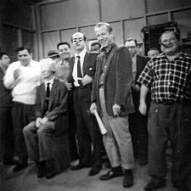
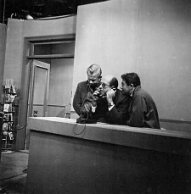
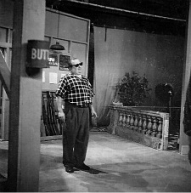
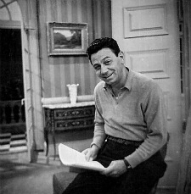
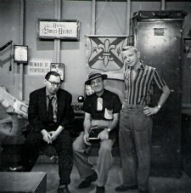
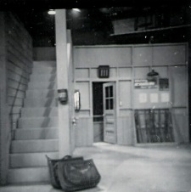
All images courtesy and
© Maybeth Curtiss & The BPSAS 2010
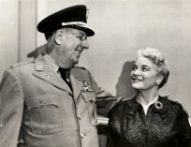
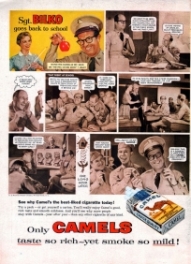
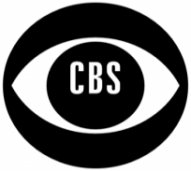
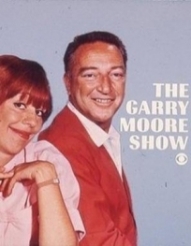
The Ballad Of Louie The Louse
Phil Silvers......Louis 'Louie' Cramfield
Edward Albert......Paul Barton
Pert Kelton......Beggar Mary
Betsy Palmer.......Tina Adams
Gerald Hiken......Longshot Leo Drayer
Leo Liebman......Harold Cramfield
Paul Lipson......Sam Siegel
John C. Becher......Mike
T.J. Halligan......Mr Fortwright
Harry Stanton......Mr Braydon
Heywood Hale Broun......Radio Operator
Written by......Nat Hiken
Produced by......Nat Hiken
Directed by......Greg Garrison
Associate Producer......Lou Tedesco
Musical Score by......Gordon Jenkins and Nat Hiken
Musical Conductor......Charles Sanford
A CBS Production
Broadcast date: 17th October, 1959 - 8.00 - 9.00pm CBS Television
When CBS announced the cancellation of The Phil Silvers Show in June of 1959 it came as both a shock and ultimately a relief for Phil Silvers. After four arduous seasons Phil felt he was ready to move on from the character of Sgt. Bilko.
"It was four years of fun but it was hard work. I was the star of the show and I took a hell of a beating. Everyone depended on me to be this dynamo that was Bilko but I have to tell you it took a lot out of me!", said Phil.
In order to sweeten the deal CBS offered Phil and Nat the chance to collaborate on a series of four one-hour television musical specials, the first of which was entitled The Ballad Of Louie The Louse.
In an interview for the 11th October edition of The Modesto Bee, Phil had this to say: "Louie the Louse makes Bilko look like a Sunday School teacher! He is Shylock, Captain Hook and the entire Medici family all rolled into one and operating on Broadway!".
The basic premise of the show was a Runyonesque twist on Charles Dickens' A Christmas Carol, in which Phil's character is made to see the error of his ways through the suffering of people around him.
"I'd been a fan of all things English for all my professional life. On a trip to the UK in 1957 I went to see a traditional English pantomime and loved it. For me it was an English twist on the best and worst of our Burlesque theatre. Both Nat and me thought there was mileage left in bringing the flavour of live musical theatre to TV."
"After two weeks of self-doubt I was ready to go again!", said Phil. "Filming on Bilko was a killer. We had four days of blocking and rehearsing....Fridays I did the warm-up and we spent two hours filming. My weekends were spent learning the lines for next week's show. Now all of a sudden we were dictating our own schedule!".
Nat and Phil began working on the script and brought Gordon Jenkins in to work on the original musical score. Jenkins was a popular composer and arranger who'd worked for Nat King Cole, Judy Garland and Louis Armstrong.
The director assigned to the show was Greg Garrison. Garrison had broken into television directing Milton Berle in the hugely popular Texaco Star Theatre. The show was later renamed The Milton Berle Show and helped seal Berle's reputation as the 'King Of Television'.
The plot of The Ballad Of Louie The Louse was a skilfully woven tale concerning the antics of a Broadway loan-shark, Louie Cramfield, and proved yet again the sheer depth and imagination that was the cornerstone of Nat Hiken's work.
Cramfield is reportedly lost at sea, following an air crash. A news reporter writes a kind but mis-leading obituary about his life. On hearing the news, his former victims vow that his death will reform them. When it turns out that Louie did not die in the crash he vows to reform and try to live up to the kind things that were written about him.
Phil recognised that despite his desire to escape the shackles of Bilko, Louie Cramfield was very Bilko-esque. "Right from my days in Burlesque I'd played this kind of fast-talking, conman-with-a-heart-of-gold character. I'd been playing Bilko before he was ever born on TV....so Louie Cramfield was just another version of that fellow. Nat just wrote him a shade darker!"
The show was nominated the following year for an Emmy Award for writer Nat Hiken for the Outstanding Weiting Achievement In Comedy and although it failed to win it brought Hiken's superlative writting skills to the attention of the television industry once again.
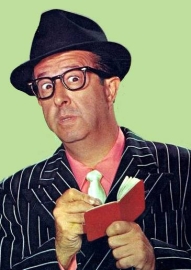
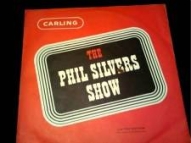
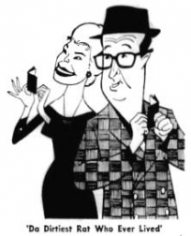
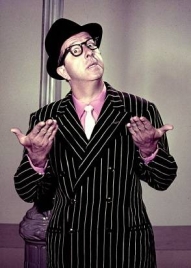
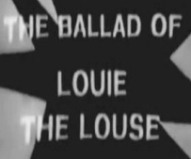
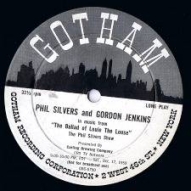
Gerry Hiken - Portrait Of An Artist
Writer, artist, filmmaker and magician Jonathan Steigman recently released his short film, entitled Gerry Hiken - Portrait Of The Artist As An Old Man. Jonathan, who grew up in the US before moving to Europe and then Africa (he eventually returned to the US), has worked in film industry in both the US and abroad.
Gerry Hiken is familiar to viewers of The Phil Silvers Show for his portrayal of Private Mendelson in Bilko's Black Magic. As an actor, Gerry (billed as Gerald Hiken) appeared in dozens of US TV's most popular shows, including, Car 54, Where Are You?, Naked City, The Untouchables, Mission: Impossible and St. Elsewhere. Gerry has also carved out a hugely successful stage career with appearances in Uncle Vanya, The Iceman Cometh, The Three Sisters, The Cherry Orchard and As You Like It: A California Concoction.
"It's an 11-minute documentary about my pal Gerry Hiken, an American treasure who has been a professional actor for 60 years . In the film, Gerry muses on the artist's life, how to be a great actor, and what it means to approach death." says Jonathan. "I had many technical nightmares trying to get this made but I had fun making it and Gerry's a naturally awesome subject."
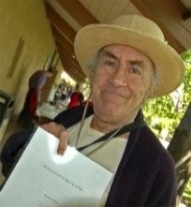
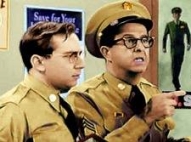
Marvin Kaplan
I recently had the great pleasure of contacting one of my childhood heroes, actor Marvin Kaplan. For the uninitiated, Marvin was the voice of Choo Choo in the popular Hanna/Barbera animated show Top Cat (based on Sgt. Bilko) and played the role of garage proprietor Irwin (alongside his Top Cat co-star Arnold Stang) in the 1963 comedy It's A Mad, Mad, Mad, Mad World.
Marvin, now 84, has enjoyed a hugely successful career as an actor, writer and producer, having worked mainly in television and films. Most recently he has written and produced a film called Watch Out For Slick.
"Phil Silvers was one of the smartest comedic actors I ever worked with. He knew when the material worked. I remember during the shooting of Mad World, I threw in a line that got a laugh. Phil begged me not to do it during the take.....I didn't...he was so right. It would have ruined the build to a much bigger laugh later on. He knew when to throw away the small fish.
He died very tragically. The industry should have taken advantage of this man's brain and let him train some of the young kids. Much as they put Buster Keaton under special contract at MGM and let him show Red Skelton how to take falls.
I saw Phil on Broadway in Top Banana, Do Re Mi and in the LA run of A Funny Thing Happened On The Way To The Forum. The critics felt his 'Pseudolous' was him still doing 'Bilko'.
He was heartbroken. I told him 'Pseudolous' and 'Bilko' were both 'commedia del arte con-men' and that was the only similarity. Shortly thereafter, in New York, he had a stroke and never really worked much after that.
I saw Phil's nightclub act in Vegas. I got in through my friend and his accompanist, Leo De Lyon. (Leo's still around. He played 'Brain' and 'Spook' in Top Cat). Anyway, Phil begged me not come to any of his opening nights. My laugh (which is distinctive) made the audience laugh too soon and it ruined his timing.
When Phil died I went to his funeral. In his will it read "GET MILTON BERLE!". No one quite knew how he meant that. Another time. another style! There's no one like Phil Silvers or Milton Berle around today. Don Rickles comes close. The closest of course, there's always Jonathan Winters and Robin Williams - my current favourites.
I've always loved British character people like Margaret Rutherford, Robert Morley, Cecil Parker, Wilfred Lawson, Dora Bryan, Joyce Grenfell, Benny Hill, Peter Sellers, Alec Guiness, and my current favourites Patricia Routledge and the gang on Are You Being Served?."
Marvin remains active as an actor, writer and producer. He is currently looking for a distribution deal for his film Watch Out For Slick, which he is also hoping to develop into a sitcom for television.
He made his film debut in the classic Tracy/Hepburn comedy Adam's Rib in 1949 and went on to appear regularly in both film and television in the likes of films such as Behave Yourself (1951), Wake Me When It's Over (1960), The Nutty Professor (1963) and Wild At Heart (1990). His television appearances include Meet Millie (1952), The Red Skelton Show (1956), The Mod Squad (1969), Charlie's Angels (1977), Alice (1984) and McBride (2005).
He is revered by fans of Stanley Kramer's 1963 comedy epic It's A Mad, Mad, Mad, Mad World for his role as Irwin, alongside his friend and former Top Cat co-star Arnold Stang (as Ray) and the memorable scenes of mayhem and chaos that ensue when Jonathan Winters (as truck driver Lenny Pike) goes on the rampage and destroys their garage.
Here are some of Marvin's memories of working on the film:
"I wasn't the first choice for 'Irwin'. I replaced Jackie Mason, who had too much of a nightclub schedule to please Stanley Kramer. I was originally up for the role Doodles Weaver did in the hardware store.
Anne Kramer, Stanley's first wife, who did almost all the casting got the idea, once this vacancy occurred, that I would make a very good 'Irwin' opposite Arnold Stang's 'Ray'. When my agent, Meyer Mishkin, whom I had for twenty-five years, sent me the script and I read all the stunts that were required I told him I almost got killed reading the script!. Meyer replied the deal he agreed to was that I would do all the stunts that my comedy partner would agree to.
I asked "Who's my partner?". When Meyer told me Arnold Stang I readily agreed. I knew Arnold was probably a bigger physical coward than I am. They got Jonathan Winters for the other part and he was an ex-Marine and thought we should all do our own stunts.
Johnny wrenched his back during a rehearsal and all three of us got stunt doubles. Arnold's was Janos Prohaska, who did all the chimps in movies. Mine was a very handsome kid named Bill Maxwell. They kept putting padding into him to make him look as fat as me. I kept taking it out because I wanted to look thin. They made him wear my eyeglasses and he walked into a tree.
There was one scene where they kept banging Phil into a gas pump and Jonathan kept hitting him with a light tyre. They gave Phil knee pads and shoulder and arm pads. Jonathan didn't hit him in the knees or arms....he hit him in the groin and in the head. Two takes and Phil had to go to the hospital!
I made sure after that I wore as much padding, including head protection, as my stuntman. Arnold broke his left wrist the night before our first day. He slipped and landed in the hotel swimming pool. Arnold arrived on the set with his wrist in a cast. Kramer said "Thank God it's your left hand!". Arnold said, "I'm left-handed!." They gave him workmen's gloves. In the good hand he carried a wrench. I did all the work, washing windshields, gauging tyres for air, changing tyres. I didn't care. I was in such heavenly company: ETHEL MERMAN, TERRY THOMAS (whose only make-up was having his knees powdered) JONATHAN, ARNOLD, MILTON BERLE, PHIL, BUDDY HACKETT.
I shared a trailer dressing room with Jonathan. My job was really as a babysitter. It was the only cool spot on the set and Jonathan had a terrible time in the 107 degree heat. You had to improvise to keep Johnny relaxed. One day he was the Tuesday bear and you had to be another bear, the zoo-keeper or the audience feeding the bear. And I'm not talking five minutes. Sometimes it would be an hour between shots. He could ad-lib forever and the man is an authentic genius!
The problem is, if someone else walked in and I asked him to repeat some of the shticks, he'd stare at me and not be able to remember. You had to catch him on the spot. I only worked with two authentic geniuses in my life. One was Charlie Chaplin, for whom I stage-managed. The other is Jonathan Winters.
I did The Smurfs later on. Jonathan played 'Grandpa Smurf'. He could manage to make the most innocent lines sound filthy. It was difficult working opposite him on mike. All he had to do was look at me and I'd be gone. He knew I was easy to crack up and we both appreciated him doing it!
STAY WELL. THE BEST -

MARVIN KAPLAN
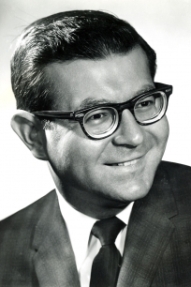
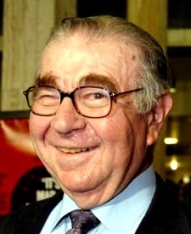
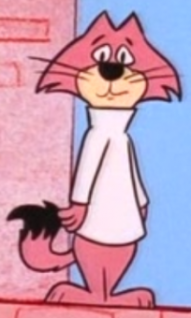
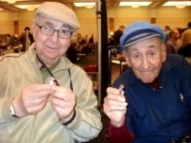
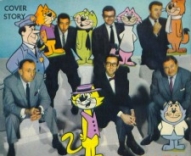
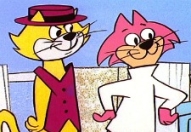
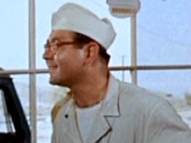
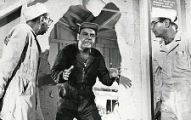

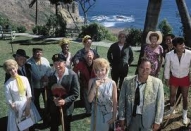
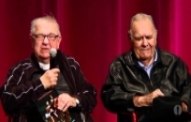
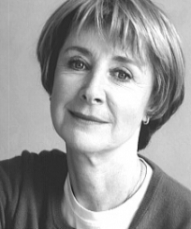
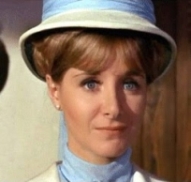
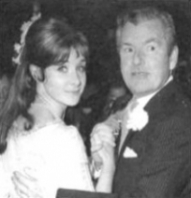
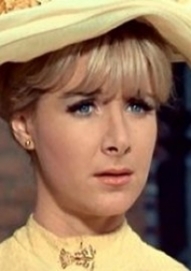
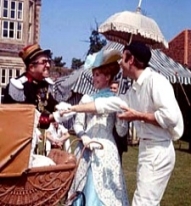
Angela Douglas
Angela Douglas was born Angela Josephine McDonagh in 29 October 1940, in Gerrards Cross, Buckinghamshire. As a youngster her parents enrolled her at the Aida Foster Stage School but she left before completing the course. Angela promptly joined the Worthing West Sussex Repertory Company and after several months she acquired an agent and the offers of professional engagements began to come in.
She made her West End debut in 1958. Early television appearances included Dixon Of Dock Green (1958), Coronation Street (1961) and Emergency Ward 10 (1961).
She made her big screen debut in 1960 in the crime drama The Shakedown alongside Donald Pleasance and Harry H Corbett. In 1962 she worked with popular British actor Kenneth More in Some People and it was during filming that they embarked upon an affair, which eventually culminated with their marriage in 1968.
It was in 1965 that Angela made the first of her four appearances in the Carry On film series when she signed to play the role of Annie Oakley in Carry On Cowboy. She played the love interest to Jim Dale's hapless Marshall P Knutt and they began a friendship which endures to this day.
Her second appearance, again alongside Jim Dale came in the hilarious Carry On Screaming (1966), a parody of the horror genre. Angela returned to the Carry On fold in 1967 when she appeared in Carry On Follow That Camel. She once again played the love interest to a certain Mr. Dale. She made her final appearance in the series with her role as Princess Jehli in Carry On Up The Khyber in 1968.
Her association with the Carry On's continues to this day and she has appeared in many retrospectives, documentaries and conventions connected with the films. In 2005 she unveiled a plaque in North Wales which was dedicated to the filming of Carry On Up The Khyber. (Parts of the film were shot in Llanberis).
Sadly it was during the 1970's that Angela's husband Kenneth More was diagnosed with Parkinson's Disease. Following a brief separation, they reconciled and she subsequently retired from acting to nurse her husband.
Following Kenneth's death in 1982, Angela resumed her acting career with appearances in The Gentle Touch (1984), Doctor Who (1989), Soldier, Soldier (1994) and Peak Practice (2001). More recently Angela has enjoyed a career as a journalist. Her autobiography Swings & Roundabouts has recently been updated and re-released.
The Society had the pleasure of talking to actress Angela about her experience of working on the popular Carry On film series and of her memories of working with Phil in Follow That Camel.
"I met with Gerald Thomas and Peter Rogers at the Dorchester Hotel in London and they offered me a part in Carry on Cowboy. Of all my Carry On's that was my favourite role. I played Annie Oakley. And working with Jim Dale was so much fun. I'm still friends with him today and I go to see him whenever I'm in New York. We had such enormous fun during filming. They were such happy days.
My memories of Phil Silvers? When I first met him he was sitting huddled in front of an enormous fire. It was a hot day and here he was sitting in front of a roaring fire. I introduced myself and he said to me, "Angela, have you ever been constipated?". I thought it was a strange question to ask.
I've always found those famous comics a miserable lot....they're not funny funny. They're often very serious and depressive. Phil was obviously unwell. His wife had just left him and he was also suffering terribly with his eyesight. But I do remember being at the hotel with Jim (Dale), Peter (Butterworth) and Bernie (Bresslaw) and Phil was regaling us with these wonderfully amusing anecdotes about his early days in showbusiness. He certainly received the cold shoulder treatment from Kenny Williams but he was always professional and very jovial when we were filming.
My last appearance in the series was Carry On Up The Khyber. Gerald and Peter asked me to stay but I left to have a baby. Happy memories!".
ANGELA DOUGLAS, 2012
John Challis
I recently had the very great pleasure of meeting actor John Challis at a recent book signing event. John is best know for his portrayal of Boycie in both Only Fools & Horses and it's spin-off series The Green Green Grass.
John has enjoyed a long and varied career on both stage and television. His television credits include appearances in Softly, Softly, Dixon Of Dock Green, Crown Court , Z Cars, Coronation Street and Doctor Who.
It was his appearance in an episode of Citizen Smith that brought him to the attention of writer John Sullivan. Sullivan's next project for the BBC was Only Fools & Horses and Sullivan felt that John was perfect for the role of the oily, second-hand car dealer Terrence Aubrey Boyce.
It was a role which finally brought John deserved recognition and earned him a place in the hearts of the nation's viewing public. So successful was the character that he was afforded his own series The Green Green Grass, again from the pen of John Sullivan, which saw Boycie moving to a farmhouse in Shropshire to evade the clutches of the infamous Driscoll brothers.
John is now also a successful writer and publisher. The first part of his autobiography Being Boycie was published through his own publishing company Wigmore Publishing, and he has just released a companion volume entitled Boycie & Beyond.
Recently he's been touring the country with his one-man show Only Fools And Boycie – an Intimate Evening With Actor John Challis.
I initially asked John about his early days as an actor:
"I've done many things over the years....Z Cars, Doctor Who, Coronation Street....I even worked with The Beatles - but I'm known everywhere as Boycie. For some reason the people love him, they still do and that allows me to do things like the autobiographies, the tour and the book signings. I get the chance to meet these wonderful people of all ages and all walks of life who all seem to love Boycie. I spend a lot of time now on Twitter talking with the fans of the show."
Is there any possibility of a final Only Fools & Horses special?
"Shortly before John Sullivan died there had been talk of another Only Fools special centered around Del's 65th Birthday, but with John's passing I think the door has finally closed on any possible reunion."
Were you ever a fan of Phil Silvers and Sgt. Bilko?
"It's one of my favourite shows. I grew up with it and I loved all those characters like Doberman....all those wonderfully funny people and marvellous characters. I loved Phil as Bilko......the way he talked so fast and rattled out those funny lines. I've played a few fast-talking characters in my career but nothing came close to Phil as Bilko. He was brilliant....such a well written show with some brilliant characters......it's such a shame that they don't show Bilko on television any more. A great show and I have many happy memories of watching it!."
JOHN CHALLIS
April 2013
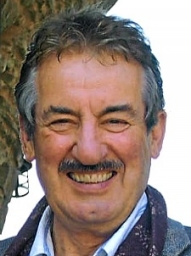
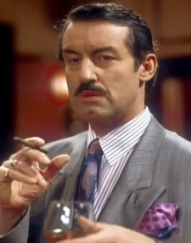
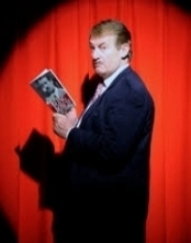
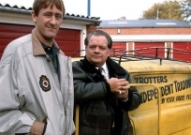
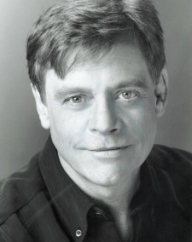
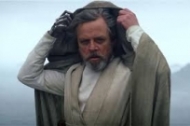
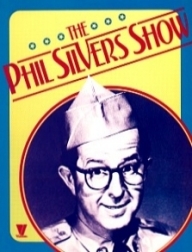
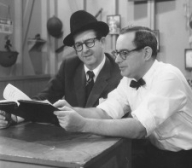

Mark Hamill
Mark Hamill is a man of many talents - actor, voice-over artist, producer, director, and writer. He's probably best known for his portrayal of Luke Skywalker in the original Star Wars trilogy and his voice-over work as The Joker on Batman: The Animated Series.
He's currently working at Pinewood Studios where he's filming the next instalment of the Star Wars saga. In April of 2014 he was interviewed by US TV network Me-TV. During the interview he spoke of his admiration for Phil Silvers, Nat Hiken and The Phil Silvers Show.
A lot of comedians point out how great Sgt. Bilko was, and how influential a show it is. Do you have any thoughts on that?
First of all, I think it’s the meeting of two comedic geniuses, Phil Silvers and Nat Hiken. You read about the genesis of the show, and that they were trying to figure out a way to best use Phil Silvers’ con man, fast-talking shyster character. And when they came upon the idea of putting him in the Army, and having him running his own private little fiefdom, it was perfect. Because it was post World War II, there weren’t any major confrontations going on in the world. Nat Hiken had an ability to write farce.
One of the things I love about the show so much is that it was done in New York, and so the supporting cast and some of the guest stars are some of the best character actors in the New York theater, on and off Broadway. And that was carried over, you see a lot of the same actors repeat in Car 54. Not only Fred Gwynne, who did several guest appearances on Bilko, but Joe E. Ross, who played Sgt. Ritzik on Bilko, and Toody on Car 54. And the actor who played his wife, Lucille, on Car 54, Beatrice Pons, she was from the Yiddish Theater in New York, and she’s just a comic dynamo. When she goes to the window and screams, “I’m married to a nut! I’m married to a nut!” Just incredible! And Alice Ghostley and Al Lewis.
And in some ways I am blurring Bilko and Car 54, but they’re both these gang comedies; one set in the Army, one set in the police force. But they both have this great contrast of rigid, orderly behavior with this out of control, chaotic comedic behavior, and nobody did it better than Nat Hiken.
There’s that episode of Sgt. Bilko called “The Court Martial”, where they’re trying to streamline inductions into the Army and they accidentally induct a chimpanzee! It’s one of the greatest half hours of comedy I’ve ever seen. When people come over and they haven’t seen Sgt. Bilko, that’s the one I’ll put on. And if you watch that and don’t laugh, well, we have nothing further to discuss!
In the courtroom scene, the monkey gets up out of the chair, goes upstage and picks up a phone receiver, and without missing a beat, God bless Phil Silvers for having that vaudeville and stage experience, and says (Here Mark does a spot-on Phil Silvers impression), “Just hold it a minute. He’s consulting another lawyer!” You see the other actors, all these great dramatic actors, Paul Ford, Barnard Hughes, just these people who were rocks of dramatic live television like Playhouse 90 and Alcoa Theater—and that’s what’s so important in farce; these dramatic actors playing the truth that’s written into these characters—but you see all these guys strain not to break! They put their hands to their mouths, and it’s just astonishing to see how quickly Phil Silvers comes up with that ad lib.
Another one of my favorite episodes is “A Mess Sergeant Just Can’t Win”, and I think you guys aired that last Saturday night. It’s where Bilko feels bad that he’s taken advantage of Ritzik to such a degree that Ritzik is broke, and he’s gonna leave the Army to get away from Bilko. So Bilko endeavors to make a bet with Ritzik that Ritzik can’t lose, but he keeps winning. Ritzik is born in Cincinnati, but Bilko bets him that he was born in Singapore! And like any great farce, it just keeps on escalating and piling on quickly.
MARK HAMILL
April 2014
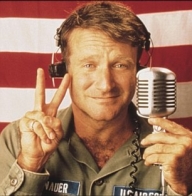
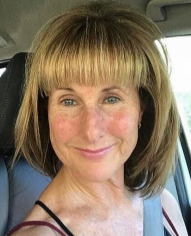
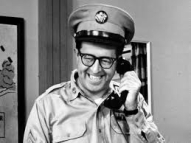
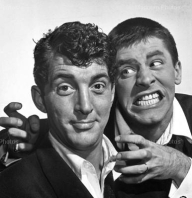
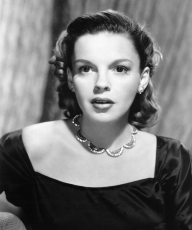
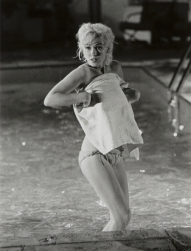
How Bilko Tried to Save Robin Williams
For the man who made Sergeant Bilko into a comedy legend – one that endures even 60 years later – this was no laughing matter. Phil Silvers – who played Bilko in the hit TV series that ran on BBC1 and 2 from 1955 to 2004 and is now being mooted for a re-run on BBC4 next year – was talking to a rising star called Robin Williams.
The year was 1980 and at a charity show in Hollywood, Williams came face to face with Silvers, his hero. Silvers’ daughter Cathy, who had just been cast in Happy Days as teenager Jenny Piccalo, was there and remembers the advice he gave Williams. ‘It was the same advice Dad gave me,’ says Cathy. ‘He told Robin, “Treat acting as a business and don’t let it go to your head.” Then Dad cried and said, “You don’t want to end up like my friends”, because some of them, including Marilyn Monroe and Judy Garland, had died tragically. I guess Robin didn’t take his advice.’
It’s a poignant time for Cathy, 53. Not only is she still reeling from the death of Williams last month – he had remained a lifelong friend – but next year is the 30th anniversary of her father’s death and a commemorative DVD box set of the Bilko shows is being released this month.
There are similarities between Robin Williams and Phil Silvers. Both were comedy geniuses who struggled with addiction (with Silvers it was gambling, with Williams drink and drugs) and both had periods of depression. Silvers once admitted, ‘I only smile in public. When I’m alone, I just sort of stare. People know that we actors are frightened. And when they read this, they’ll know that I’m depressed.’
The Phil Silvers Show – known as Sgt. Bilko – ran for 143 episodes. Sergeant Ernest G Bilko was the wise-cracking boss of a team at fictional US Army base Fort Baxter, who spent more time concocting get-rich-quick schemes – none of which were successful – than working. It won three consecutive Emmys and turned Silvers into a star. He performed at the White House for President Eisenhower and John F Kennedy would even call him at home. ‘He loved Dad and we’d get these calls to the house,’ says Cathy. ‘Kennedy would be lying on the floor because of his bad back and would say, “Phil, I’m in pain” and so Dad would launch into some comedic routine and crack up the President.’
Certainly the early days of Cathy’s childhood were marked by glamour. Growing up in Beverly Hills with her four sisters, father Phil and mother Evelyn Patrick (Silvers’ second wife), Cathy would often witness her parents’ lavish parties. ‘Lucille Ball lived up the street so she’d be there and so would Ed Sullivan, Dean Martin and Jerry Lewis.’
Frank Sinatra was also a good friend. Silvers wrote the lyrics to one of Ol’ Blue Eyes’ most popular songs, Nancy With The Laughing Face, and both had a fascination for the Mafia. ‘Once Dad and the gangster Bugsy Siegel were being taken to the opening night of the Tropicana hotel in Las Vegas,’ says Cathy.
‘Suddenly, shots were fired through the back window and Bugsy threw my dad onto the floor, shouting, “Phil, Phil, I’m so ashamed. You’ve made me laugh all my life and I love you and now we might not live to get to Vegas.” My dad had found himself in the middle of a gang shoot-out. Obviously, he did survive and we never worried about the Mafia because Dad was loved by them.’
Vegas, however, was dangerous for Silvers for other reasons: he was a compulsive gambler. His first wife, ex-Miss America Jo-Carroll Dennison, once remarked, ‘We never lived expensively, or travelled, because he gambled everything away,’ Says Cathy now, ‘He was addicted to gambling and though it didn’t affect my life, it was a problem. There wasn’t help like there is today.’
Silvers’ absences took their toll on his marriage and Cathy’s parents divorced when she was five. He was, however, never short of female company, ‘His three best girl friends were Judy Garland, Marilyn Monroe and Audrey Hepburn,’ she says. ‘I think because he was single and he wasn’t a womaniser, they felt comfortable with him. I wouldn’t know if he fell in love with them – he wouldn’t have told me – but they loved to talk about Dad and what an amazing friend he was.’
Silvers starred in the 1962 film Something’s Got To Give opposite Monroe in what was to be her last film, and though it was never completed, he did film its most memorable scene.
‘Dad walked down the stairs and there was Marilyn, naked, sitting at the edge of the pool covering her breasts with her hands for the famous pool scene,’ says Cathy. ‘She died shortly afterwards and so maybe Dad had one of the last conversations with her. He was very fond of her.’
Phil Silvers died in his sleep in November 1985 aged 74. Cathy is now an advocate for healthy eating and lives in LA with her husband and two children. She’s currently writing a script about her father, ‘taking us through his experiences of vaudeville, silent film, Broadway and the move to Hollywood. He made me laugh so much, but his gift was a gift to the world.’ And to the world, Phil Silvers once said, there was only one role he’d be remembered for. ‘To them,’ he admitted, ‘I’m Bilko.’
Daily Mail, September 12, 2014
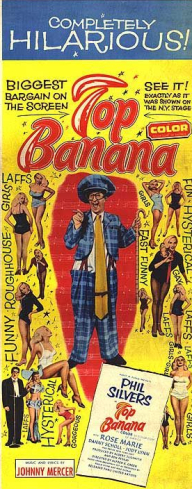
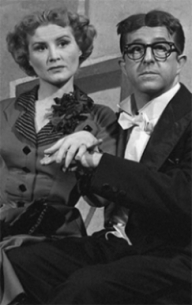
‘Top Banana’ Is To Be Filmed By Original Cast
Would you like to see a Broadway show on the movie screen?
I don’t mean a film version of a stage hit. I mean a musical filmed almost exactly as it was presented on Broadway at $7.20 top. A group of independent movie makers are gambling that movie goers will buy such an attraction. Wide-screen and 3D will be added to make the show seem more lifelike.
The subject of this unique experiment is Top Banana, the raucous hit based on the thinly disguised adventures of Milton Berle in TV. The musical ended its road show run in Los Angeles three weeks ago. Now the entire production has been moved onto a movie stage, where it will be filmed as it played to theater audiences.
The movie will have the same sets, the same costumes and the same cast, headed by Phil Silvers. Sole change: Rose Marie has been brought back to her original comedienne role, replacing Kaye Ballard of the road company. The only other changes are in some of the dialogue and action. The profanity and a few shady lines have been tossed out to meet film censorship requirements. Also the strip-tease number has been toned down.
Veteran director Al Green, who filmed the Jolson and Cantor biographies, is directing Top Banana. He said it’s not as easy as it looks. When I mentioned that the actors ought to be well rehearsed in their parts by now, he replied: “Not exactly. All of the cast have been out of the show for three weeks, and Rose Marie has been out of it for a year. Besides, they can’t do the show exactly as it was done on the stage. The movies require less projection, less playing to the rear of the house.”
Although the show will be filmed in its entirety, it presents technical problems, he added. Lighting will not be easy, particularly in 3D, which requires hotter lights. He said the camera will not remain stationary, but will roam around and even go in for closeups.
What about the strip-tease? “We have to modify it a little,” he admitted. “You can’t do a ‘bump’ toward the audience. But you can do it sideways, which is almost as good.”
Film audiences will be given the feeling of the theater, Green said. Opening shots will show the audience coming into the theater and the orchestra playing. Otherwise, the entire show will take place between the arches of the stage.
“I think this will start a whole new trend of filming stage plays,” remarked the director. He is shooting his first picture in wide-screen and 3D, but he’s used to pioneering. “I went through the early talkie days,” he said. “I was the first to use a moving mike. They used to think that an actor had to keep his mouth shut while moving from one stationary mike to another. I put a mike on a fishpole so the actor would talk anywhere on the set.”
By BOB THOMAS
Associated Press, syndicated
23 July 1953
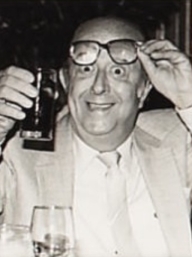
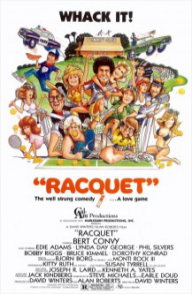
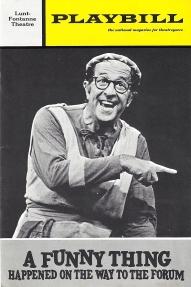
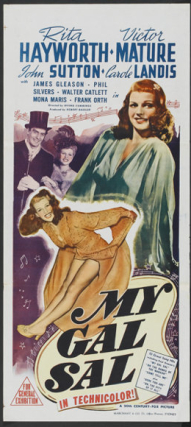
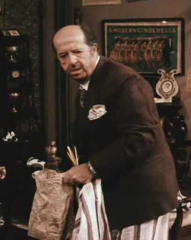
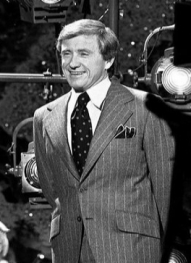
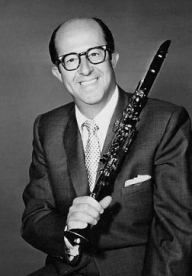
Phil Silvers, Top Banana For $13 A Job
“It’s all over with me,” says Phil Silvers, 66. “I’m not working as I should. The phone has stopped ringing.There was a time, says Silvers, “when I was the top celebrity in the world, excluding Bob Hope.” In the ’50s, he recalls, his weekly “The Phil Silvers Show” “put Milton Berle off the air.”
Silvers is reduced to now-and-then guest appearances on shows like “Charlie’s Angels” and every-once-in-a-while two-scene roles in off-the-lot films like the upcoming “Racquet,” which is scheduled to open next month.
“ ‘Racquet’ was a one-day shoot. I did it for no money. I did it for what I used to tip the doorman. But I’ve never been funnier in four minutes.” Once known around the world as the tough-but-nice Sgt. Bilko, Silvers today works for “$13 a job.” He even has trouble getting an agent. “It’s a ‘Mork and Mindy’ world,” Silvers sighs.
What happened? Silvers has been ill. “I recovered, but nobody knows it,” he says. Silvers desperately wants to be a star again. Seven years ago, Silvers suffered what he calls “a slight stroke” when he was at the height of an earlier comeback.
“It was during the Broadway run of ‘A Funny Thing Happened on the Way to the Forum,’ ” Silvers recalls. He can’t resist interrupting himself: “Did you ever hear of anyone winning a Tony for a revival?” Yes, Silvers won the second of his two Tonys for “Forum.” He’d like no one to forget that.
“There I was, applause, applause, and one morning I woke up and I couldn’t reach the telephone. “I’m fine now. See the fingers? See the arms? But it took a long time to recover because I gave up. I wanted to die. Comedians are all tragic figures. I wanted to die. All I could think of was, I closed the show, I closed the show. “Then I went into a depression. I’m out of it now. I'm fine, but nobody believes me.
“Do I look like I’m ill? I’m well. If anything, I’m too well. Do you think I come on too strong?” Silvers does indeed come on strong. He worked hard for everything he achieved, and he can’t understand why hard work won’t get him what he wants now.
Wolfing down a Brown Derby lunch, carrying on the threads of a dozen stories at once, Silvers comes on like a dynamo without a flywheel. He still has the power, but there’s no work to do.
“What you’re seeing now is . . . it’s dreadful to be a character, and to be aware of it. The reason I talk so much is that I’ve been with the best. I’ve been around so much . . .”
At the age of 10, Silvers was singing professionally in New York. This was just after the First World War. He worked his way up through the ranks of vaudeville to the top—the Minsky circuit. In the movies, he began in two-reel comedies and graduated during the Second World War to features.
Fox used him in 23 wartime comedies, playing the hero’s pal in pictures Iike “My Gal Sal” and “You’re in the Army Now.” Today, Silvers lives in a high-rise near the Fox Studios.
“This building leans out over the place where I spent all those years following Victor Mature around. I always had the same line in every picture. ‘I got the stuff in the car.’ I never did find out what the ‘stuff’ was.”
Silvers was successful enough on Broadway after the war and in nightclubs, but his snappy delivery and heavy black-rimmed glasses didn’t become familiar all over the world until he went on TV in 1955 in a program called “You’ll Never Get Rich.”
Silvers’ Sgt. Bilko character stole the show, which was quickly renamed “The Phil Silvers Show.” “Mr. Eisenhower had it every Wednesday morning in the White House,” Silvers recalls.
“One day I blinked and the show closed. CBS claimed it was too expensive. They had to pay a whole platoon of actors. “They canceled us at our height, despite mammoth ratings, because they wanted to get their money back in syndication. They had 148 episodes, and pretty soon they wished they had more.
“It had its 50th rerun on Channel 13 not too long ago and it outrated the network programs. In Australia, still, I’m an idol. I can’t cross the street in England. I don’t get any money for it now, but I did for years.”
Even if Silvers hadn’t been up there with Berle, Ball, Webb, Caesar and Sullivan, he’d be remembered for his postwar Broadway long-runners “High Button Shoes” and “Do Re Mi.”
Today, Silvers feels he’s not sufficiently remembered. He mentions being taken to the Brown Derby a year or two ago by one of the top agents in town.
“What a romance this guy handed me. I knew it was a brush-off. He pushed every button on his desk, and his whole staff trotted in, the oldest one of them 11 years old. He told me what they were gonna do for me. “I never heard from him again.
“No names, I’ll tell you something else. I did a test for the TV ‘Sunshine Boys.’ The day I was there, the hall was full of incredibly talented old actors who had never tested before. “My test was brilliant. By now, I got no time left for nonsense. I don’t say I’m good when I’m not. I never heard anything, so I called the director. He said he and the producer had agreed. It was no contest, I was so brilliant. But the producer turned me down. ‘Silvers has been ill. I’m afraid he won’t stand up.’
“So I called this producer. I told him, ‘I’m a compulsive gambler. I got five kids to support. I got a doctor’s certificate. I’m well. You’re ruining my career.’
“The show lasted one night. With Red Buttons.”
Silvers has had similar disappointments. Once a part he was up for went to—“You won’t believe it”—Eva Gabor. So Silvers survives doing guest shots, awaiting the break that will put him on top again, though he fears it will never come.
“You do something small, as a favor for a friend, and it’s like a fingerprint. They never let you get over it.” He mentions one possible upcoming film role this summer, “as O.J. Simpson’s manager.”
Two ideas keep him going—dignity and revenge. “Even in burlesque I always had dignity,” Silvers claims. What is dignity in a comedian? “Dignity is never selling yourself short. I never said a single ribald line in pictures, not until ‘Racquet.’ Dignity is not saying four-letter words—but when you say ’em, say ’em good.
“Dignity is not telling racial jokes,” Silvers adds. Almost immediately, this fascinating, contradiction-ridden man launches into one of the most ribald racial jokes ever told at the Brown Derby.
As for revenge, Silvers has many enemies. They don’t know they’re enemies. They don’t know he exists. That’s why they’re enemies.
They include his former agent (“I was his first client. Now he’s gone into production and he’s getting his ass handed to him”) and a famous librettist (“His show was a flop on the road till I changed every line, and it ran three years on Broadway”).
Above all, Silvers hated being made to feel small, even when it’s unintentional. He recently appeared on the “Merv Griffin Show” and was challenged to prove he could play the clarinet. “I made Merv Griffin a star when I turned him down for ‘Do Re Mi.’ He’ll do anything I ask. I gotta go back on his show and get even with him.
“On the air he gave me a clarinet from a guy in the orchestra, and said to play it. I have as good a tone as any clarinetist, but I don’t read music. I wasn’t prepared.”
To viewers, Silvers appeared to play very well, but Silvers wasn’t satisfied. "I’m going to go back on, for revenge. I’ll go back with dignity. Get me my corporals. I’ll get even with those guys.” Thoughts of revenge keep a lot of people alive. Silvers is one of those people who has forgotten nothing and learned nothing.
“When you know pain, you change,” he says. “I’m in constant pain. Not from the stroke. I licked that. They took away the track. I’d be an animal if I ever went to the races again. I’m finished with the track. I’m finished with the business, too. But they’ll never take my talent away.”
Bart Mills
Washington Post, April 15, 1979
